Пресс-центр / новости / Наука /
Научные достижения ИБХ РАН в 2018 году
На заседании Ученого Совета ИБХ РАН 28 декабря 2018 г. были представлены результаты научной деятельности подразделений Института за 2018 год. Вашему вниманию предлагается презентация директора АГ Габибова, а также список всех достижений, поданных подразделениями.
Достижения по подразделениям:
Отдел пептидно-белковых технологий
Лаборатория биокатализа (Габибов А.Г.)
Персонифицированная терапия В-клеточных лимфом
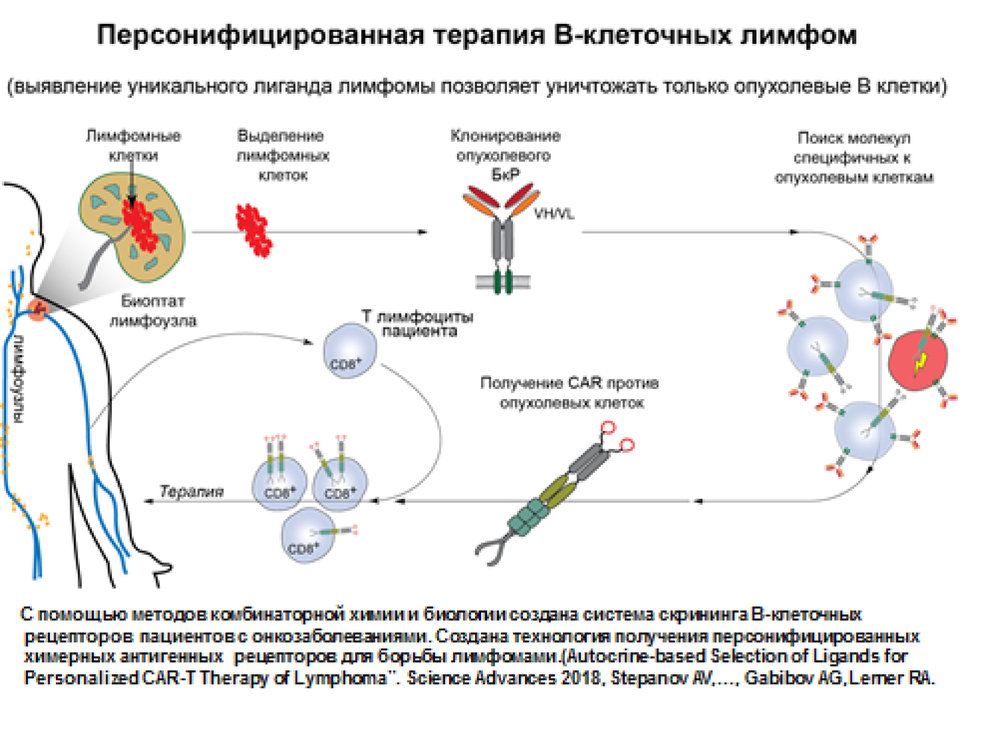
С помощью методов комбинаторной химии и биологии создана система скрининга В-клеточных рецепторов пациентов с онкозаболеваниями. Создана технология получения персонифицированных химерных антигенных рецепторов для борьбы с лимфомами
- 2018 Autocrine-based selection of ligands for personalized CAR-T therapy of lymphoma. Sci Adv 4 (11) eaau4580
Лаборатория биокатализа (Габибов А.Г.)
Микробиота ротовой полости сибирского медведя как источник новых антибиотиков
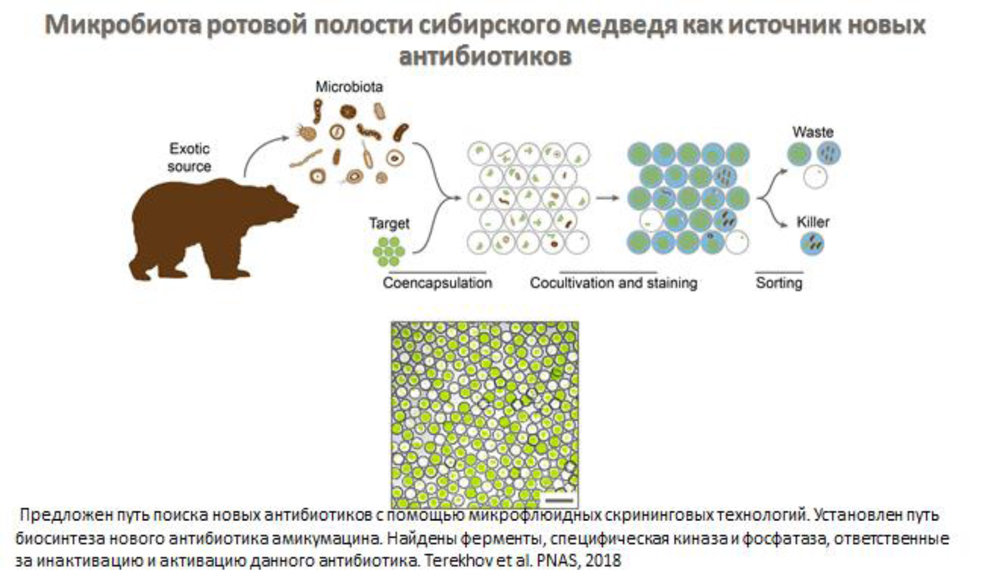
Предложен путь поиска новых антибиотиков с помощью микрофлюидных скрининговых технологий, Установлен путь биосинтеза нового антибиотика амикумацина. Найдены ферменты, специфическая киназа и фосфатаза, ответственные за инактивацию и активацию данного антибиотика
- 2018 Ultrahigh-throughput functional profiling of microbiota communities. Proc Natl Acad Sci U S A 115 (38) 9551–9556
Лаборатория клеточной биологии рецепторов (Петренко А.Г.)
,Группа молекулярной физиологии (Деев И.Е.)
Исследование внеклеточной части рецептора IRR методом малоугольного рентгеновского рассеяния и атомно-силовой микроскопией
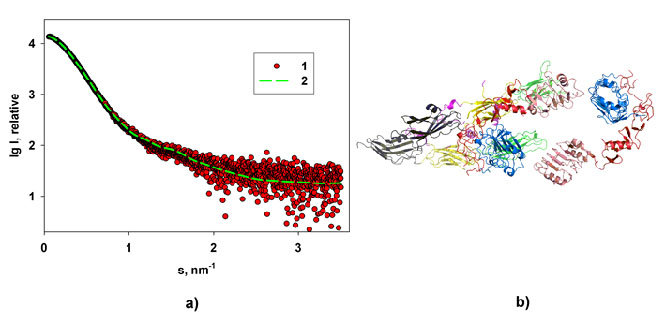
Активация IRR может быть достигнута за счет увеличения внеклеточного значения рН. Поскольку активация IRR определяется его внеклеточной частью (эктодоменом), очистка и изучение структуры эктодомена IRR (ectoIRR) представляет особый интерес для понимания фундаментальной основы механизма щелочной чувствительности. Эта работа посвящена определению возможных конформационных перестроек в эктодомене IRR, вызванных изменением рН, с использованием малоуглового рассеяния рентгеновских лучей (SAXS). SAXS является особенно полезным инструментом для исследования некристаллизующихся белков, структурной организации многодоменных белков и позволяет моделировать структуру из субъединиц, для которых доступны кристаллические структуры или другие модели составляющих доменов.
Из данных, полученных в экспериментах SAXS, можно сделать вывод, что белок (растворимый IRR-эктодомен) в растворе существует в виде димера, имеющего молекулярную массу, близкую к той, которая рассчитана из аминокислотной последовательности с вкладом гликозилирования, но мы не смогли найти существенные различия в рассеянии рентгеновских лучей между рН 7,0 и рН 9,0
Чтобы получить подробную структурную организацию ectoIRR мы использовали гибридное моделирование с помощью программного обеспечения CORAL. Доступная рентгеновская кристаллическая структура с высоким разрешением эктодомена рецептора инсулина как ближайшего гомолога IRR была разделена на отдельные поддомены. Всего в CORAL смоделированы две полипептидные цепи (димер ectoIRR) и затем выполнен поиск оптимальных положений и ориентации жестких поддоменов. Моделирование дает хорошее соответствие с χ2 = 1.3, что подтверждает, что выбранная схема моделирования с двумя доменами на цепочку была адекватной.
Данные, полученные с помощью атомно-силовой микроскопии (AFM), также хорошо согласуются с результатами структурного анализа SAXS. Эксперименты AFM эктодомена IRR, адсорбированного на поверхности атомарно-плоской слюды, показали структуру, аналогичную структуре, наблюдаемой SAXS, без существенных различий между рН 7,0 и pH 9,0.
Лаборатория биофармацевтики (Дейгин В.И.)
Новая платформа для синтеза перорально активных пептидомиметиков на основе производных 2,5-дикетопиперазинов
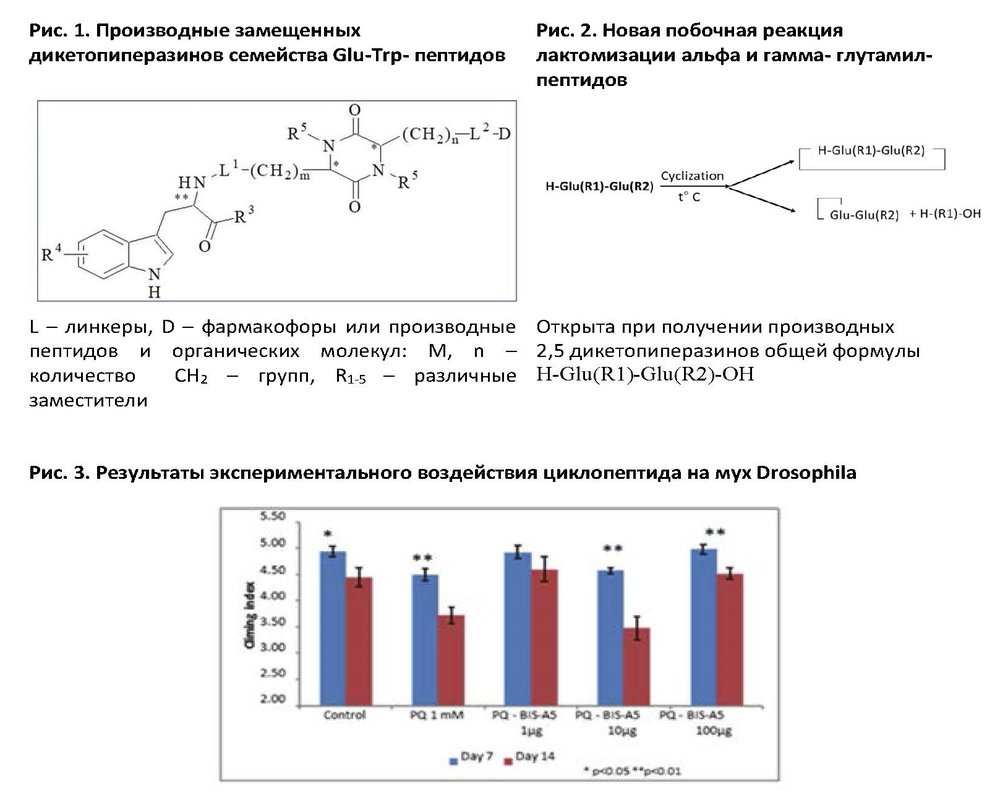
Создана новая платформа синтетических пептидомиметиков, основанная на разветвленных производных 2,5- дикетопиперазинов со встроенными пептидными линкерами, расширяющими спектр получаемых биологически активных соединений (Рис. 1). Открыта новая побочная реакция лактомизации альфа- и гамма-глутамил-пептидов (Рис. 2).
Получена библиотека циклопептидов, влияющих на начальные этапы нейропоэза. В моделях in vitro на модифицированных клетках нейробластомы человека (MC-65 cells) и in vivo на трансгенных плодовых мушках Drosophila melanogaster идентифицированы соединения, способные останавливать развитие болезни Паркинсона с последующим полноценным восстановлением функций полета насекомых (Рис. 3).
Выделены лидерные соединения для создания новых лекарственных нейропротекторов пептидной природы.
- 2018 Novel side reaction accompanying cyclization of Glu(R1)-Glu(R2) dipeptides via lactamization of the Glu(R1) residue. J Pept Sci 24 (45) e3074
Лаборатория химии протеолитических ферментов (Смирнов И.В.)
Разработка монокомпонентной поливалентной вакцины для профилактики заболеваний, вызванных бактериями, продуцирующими IgA1 протеазу
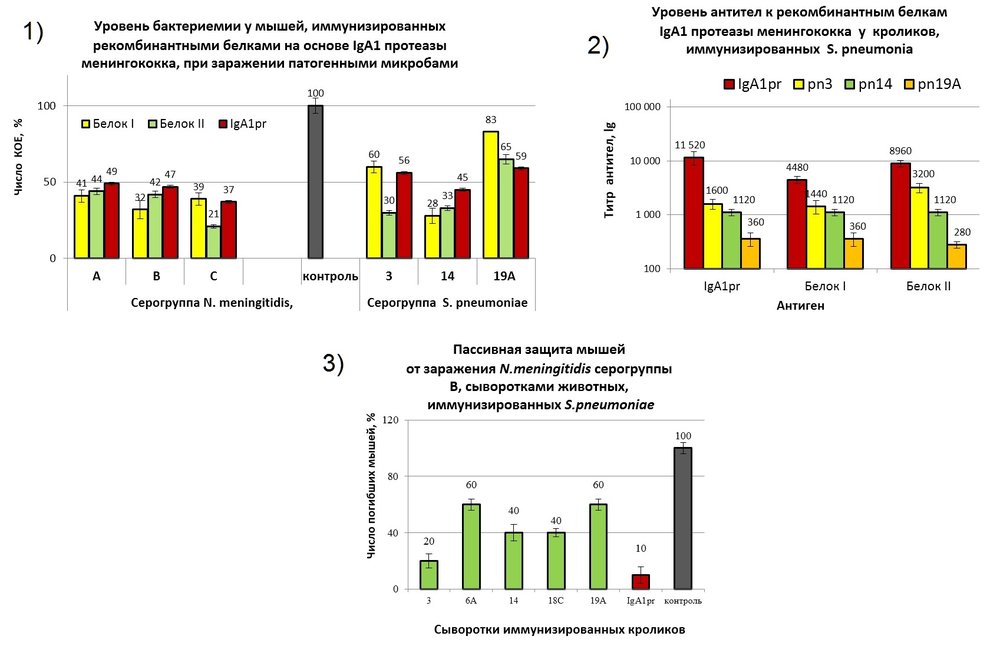
Впервые показана способность рекомбинантной IgA1-протеазы N. meningitidis серогруппы В и созданных нами химерных рекомбинантных белков, состоящих из трёх (I) или двух (II) соединенных между собой фрагментов из различных участков первичной структуры фермента, защищать иммунизированных ими животных от смертельной дозы менингококковых и некоторых пневмококковых штаммов микробов. Снижение уровня бактериемии (число КОЕ, %) зависело от структуры соединения и штамма возбудителя (Рис.1).
Впервые в сыворотках кроликов, иммунизированных инактивированными микробными клетками S. pneumoniae различных серотипов, были обнаружены антитела к IgA1-протеазе N. meningitidis и белкам I и II (Рис.2). На модели пассивной защиты животных было показано, что сыворотки этих кроликов способны защищать животных от заражения менингококками серогруппы В, что свидетельствует о возможности возникновения перекрестного иммунитета при пневмококковой и менингококковой инфекциях (Рис. 3).
Полученные данные позволяют заключить, что на основе белков I и II может быть создана монокомпонентная поливалентная вакцина для профилактики заболеваний, вызванных бактериями, общим фактором вирулентности которых является IgA1 протеаза: N. meningitidis, N. gonorrhoeae, H. influenzae, S. pneumoniae, S. sanguis, S. oralis и др.
В практике мирового здравоохранения аналогов такой вакцины не существует.
- 2018 Peculiarities of the Formation of Antimeningococcus Immunity in Mice Immunized with Fragments of N. meningitidis IgA1 Protease. Bull Exp Biol Med 165 (6) 763–766
- 2018 Immunogenic and Protective Properties of Neisseria meningitidis IgA1 Protease and of Its Truncated Fragments. Russ. J. Bioorganic Chem. 44 (1) 64–72
Лаборатория рентгеноструктурных исследований биополимеров (Плетнёв В.З.)
,Лаборатория моделирования биомолекулярных систем (Ефремов Р.Г.)
Пространственная структура и структурно-функциональная взаимосвязь зеленого флуоресцентного белка WasCFP.
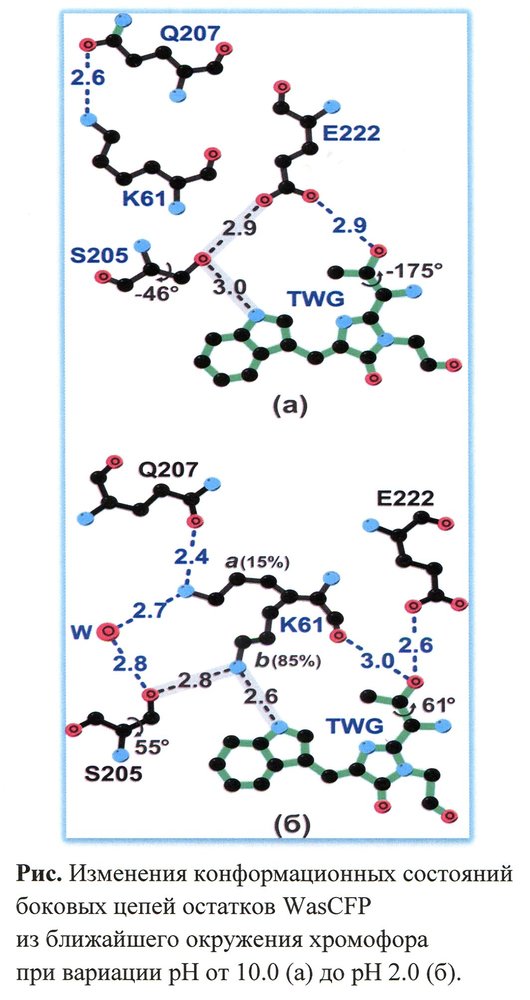
Методом рентгеноструктурного анализа установлена пространственная структура рН зависимого зеленого флуоресцентного белка WasCFP с хромофором на основе Trp при экстремально низком значении pH 2.0 с разрешением 1.3Å (ранее нами были установлены структуры при рН 10.0, 8.0 и 5.5). Показано, что последовательное изменение рН с 10.0 до 2.0 сопровождается плавными изменениями спектральных свойств коррелирующими с синхронными изменениями конформаций боковых цепей остатков в области хромофора. Влияние взаимодействия хромофора с ключевыми аминокислотными остатками из ближайшего окружения исследовано методом квантовой химии.
- 2018 Crystal Structure of the pH-Dependent Green Fluorescent Protein WasCFP with a Tryptophan-Based Chromophore at an Extremely Low pH of 2.0. Russ. J. Bioorganic Chem. 44 (6) 635–639
Лаборатория рентгеноструктурных исследований биополимеров (Плетнёв В.З.)
Кристаллическая структура белкового ингибитора протеаз Alocasin из корневища Alocasia.
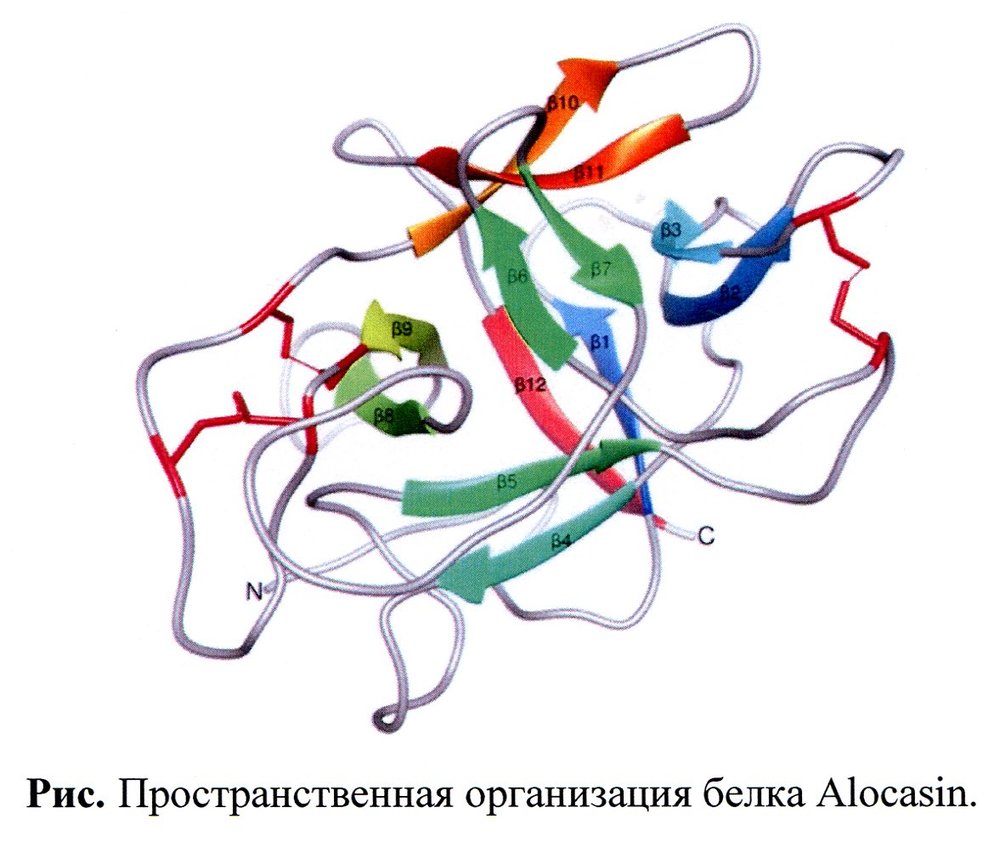
Пространственная структура β-структурного белка Alocasin из корней растения Alocasia установлена методом рентгеноструктурного анализа при разрешении 2.5Å. Alocasin проявляет сильную ингибиторную активность по отношению к трипсину и химотрипсину, а также к кишечной протеазе комара Aedes aegypti и в, этой связи, представляет интерес в качестве перспективного средства для борьбы с комарами.
- 2018 Crystal structure of a novel Kunitz type inhibitor, alocasin with anti-Aedes aegypti activity targeting midgut proteases. Pest Manag Sci 74 (12) 2761–2772
Группа молекулярной физиологии (Деев И.Е.)
Влияние гиперосмотического стресса на посттрасляционые модификации фактора транскрипции Kaiso
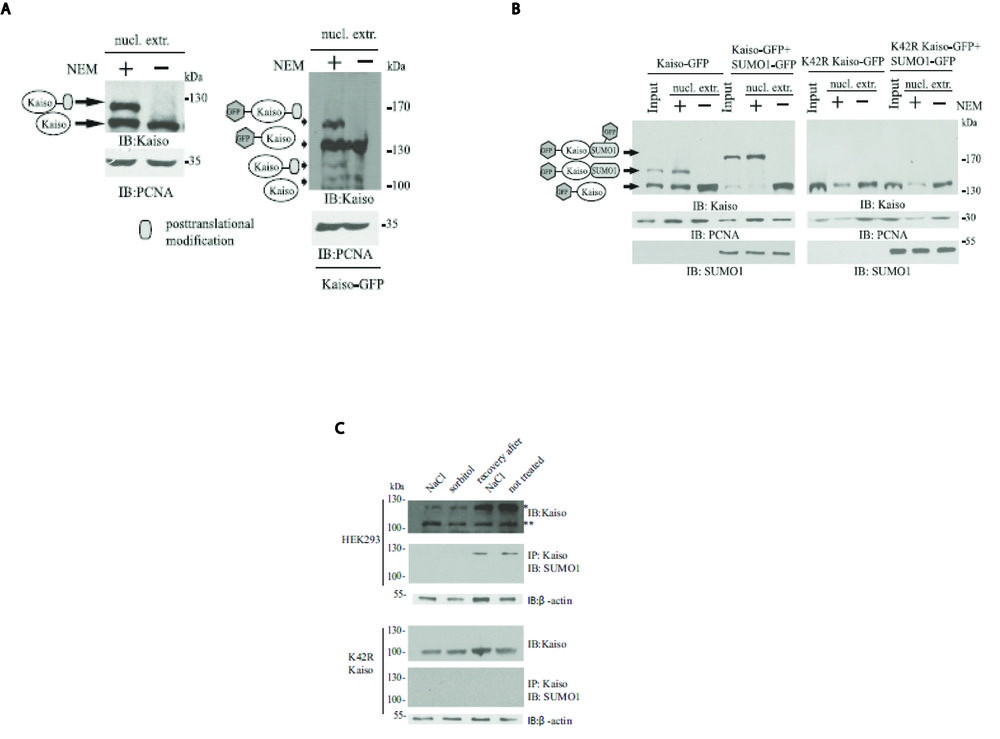
Данное совместное исследование с лабораторией профессора Егора Прохорчука (ФИЦ «Фундаментальные основы биотехнологии» РАН) позволило пролить свет на роль посттрансляционных модификаций метил-чувствительного фактора транскрипции Kaiso. Мы нашли что Kaiso существует в основном как моносумоилированный белок, то есть связан с одной молекулой SUMO. Однако если клетки экспрессирующие этот белок подвергаются гиперосмотическому стрессу, то мы неожиданно обнаружили Kaiso быстро теряет эту модификацию (dеSUMOylation). Мы показали, что потеря модификации SUMO является обратимым, так как снятие осмотического давления возвращает Kaiso почти полностью SUMO модифицируемую форму. Затем используя точечный мутагенез мы смогли картировать место модификации в этом белке и это оказался лизин в 42 позиции.
- 2018 DeSUMOylation switches Kaiso from activator to repressor upon hyperosmotic stress. Cell Death Differ 25 (11) 1938–1951
Группа молекулярной физиологии (Деев И.Е.)
,Лаборатория клеточной биологии рецепторов (Петренко А.Г.)
Профиль экспрессии генов в почках мышей, нокаутных по гену insrr
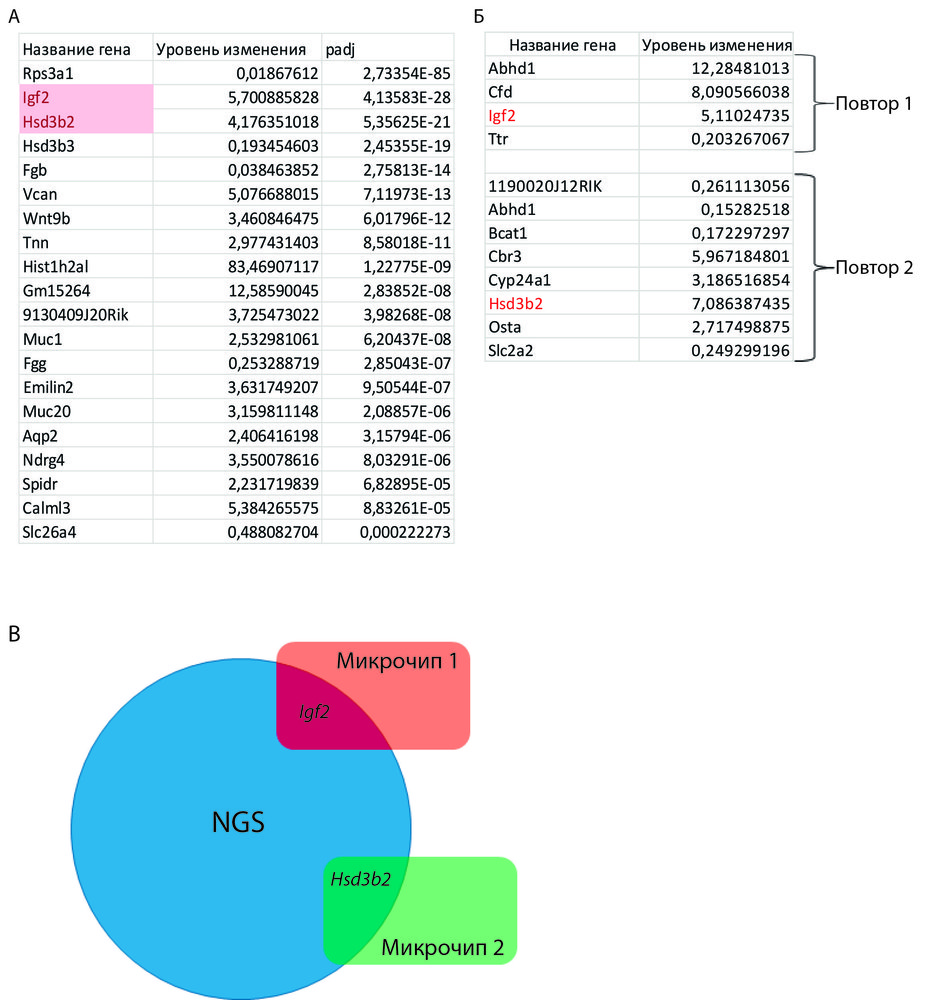
Рецепор, подобный инсулиновому рецептору (insulin receptor-related receptor, IRR), – это «сиротская» рецепторная тирозинкиназа, которая принадлежит к мини-семейству рецептора инсулина, включающему два его гомолога: рецептор инсулиноподобного фактора роста (IGF-IR) и рецептор инсулина (IR). Биохимический анализ показал, что активация IRR гидроксил-анионом аналогична активации рецептора лигандом и определяется структурой внеклеточного домена IRR. IRR обнаруживается в отдельных популяциях клеток почек, желудка, поджелудочной железы, а также в части симпатических и холинергических нейронов. Наибольшее количество IRR выявлено в почках, где он обнаруживается лишь в бета-вставочных клетках – субпопуляции эпителиальных клеток, выстилающих дистальные канальцы. Для выявления конкретных молекулярных и клеточных механизмов функционирования IRR в почках и с целью выявления роли IRR в регуляции работы почек в живом организме нами был проведен сравнительный анализ транскриптомов из почек мышей дикого типа и мышей, нокаутных по гену insrr. Достоверное изменение (увеличение экспрессии более чем в 1.5 раза в нокаутных животных) было выявлено для транскриптов двух генов hsd3b2 и igf2. Полученные результаты позволяют предположить, что линия IRR-нокаутных мышей может найти применение в качестве животной модели для изучения роли этих генов в почках.
- 2018 Profile of Gene Expression in the Kidneys of Mice with the insrr Gene Knockout. Russ. J. Bioorganic Chem. 44 (2) 256–260
Отдел иммунологии
Лаборатория молекулярной иммунологии (Деев С.М.)
,Группа онконанотехнологий (Звягин А.В.)
Гибридные наночастицы для комбинированной терапии и диагностики рака на основе антистоксовых нанофосфоров (НАФ), радиоактивного изотопа (90Y) и адресного токсина DARPin-PE40.
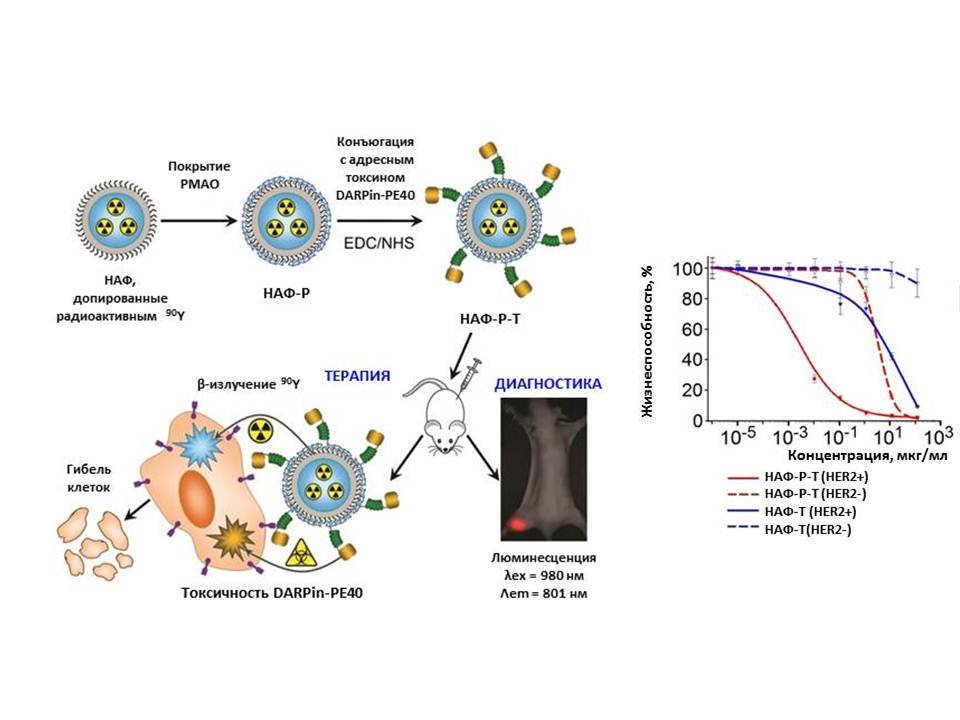
Для тераностики рака получены радиоактивные гибридные наночастицы НАФ-Р-Т, включающие антистоксовые нанофосфоры (НАФ), допированные радиоактивным изотопом иттрием-90, и фрагмент псевдомонадного экзотоксина А, снабженного искусственным адресным полипептидом DARPin, специфичным к опухолевому рецептору HER2. На мышах с привитой аденокарциномой молочной железы человека показаны высокая эффективность комбинированной терапии полученным комплексом и высокая контрастность изображения in vitro и in vivo. Показано, что синергический эффект одновременного применения радионуклида и адресного токсина с результирующим значением IC50 = 0.0024 мкг/мл в 2200 раз сильнее, чем при их раздельном применении. Результаты опубликованы в Proc. Natl. Acad. Sci. USA, 2018. Совместно с ННГУ им. Н.И. Лобачевского
- 2018 Disassembling a cancer puzzle: Cell junctions and plasma membrane as targets for anticancer therapy. J Control Release 286 125–136
- 2018 Radioactive (90Y) upconversion nanoparticles conjugated with recombinant targeted toxin for synergistic nanotheranostics of cancer. Proc Natl Acad Sci U S A 115 (39) 9690–9695
- 2018 3D in vitro models of tumors expressing EGFR family receptors: a potent tool for studying receptor biology and targeted drug development. Drug Discov Today
- 2018 Versatile Platform for Nanoparticle Surface Bioengineering Based on SiO2-Binding Peptide and Proteinaceous Barnase, Barstar Interface. ACS Appl Mater Interfaces 10 (20) 17437–17447
Лаборатория клеточных взаимодействий (Сапожников А.М.)
СУБПОПУЛЯЦИЯ HLA-DR-ПОЗИТИВНЫХ NK-КЛЕТОК ХАРАКТЕРИЗУЕТСЯ ВЫСОКОЙ ПРОЛИФЕРАТИВНОЙ И ФУНКЦИОНАЛЬНОЙ АКТИВНОСТЬЮ
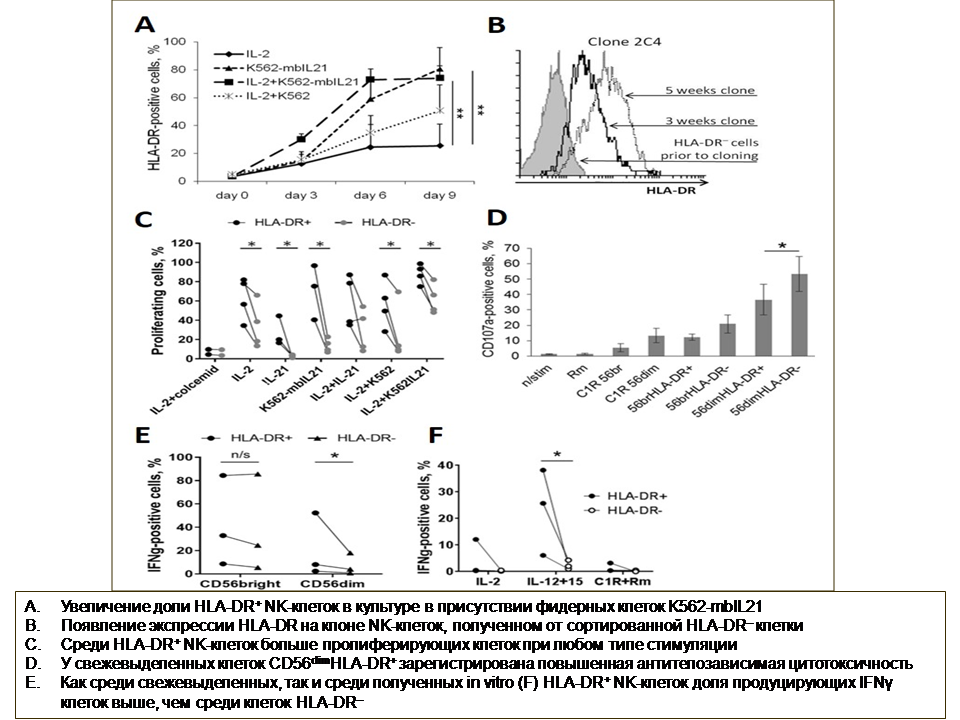
С целью получения клинически значимых клонов цитотоксических лимфоцитов разработан метод экспансии NK-клеток с использованием облученных клеток K562-mbIL21, экспрессирующих мембраносвязанную форму IL-21. Охарактеризовано распределение в периферической крови и функциональные особенности NK-клеток HLA-DR+, преобладающих в популяциях NK-клеток, полученных при использовании данного метода стимуляции.
- 2017 HLA-DR+NK cells are mostly characterized by less mature phenotype and high functional activity. Immunol Cell Biol 96 (2) 212–228
Отдел структурной биологии
Лаборатория биомолекулярной ЯМР-спектроскопии (Арсеньев А.С.)
,Лаборатория моделирования биомолекулярных систем (Ефремов Р.Г.)
Разработка метода оценки мембраноподобных сред и поиск новых составов для исследования мембранных белков

С использованием спектроскопии ЯМР был разработан новый метод оценки корректности структуры мембраноподобных сред на основе бицелл, основанный на детекции фазовых переходов липидов в бицеллах, а также изучены свойства фазового перехода в зависимости от параметров изучаемых смесей. В серии работ были исследованы характеристики множества различных составов бицелл, найдены среды, способные имитировать различные аспекты поведения клеточной мембраны. Разработаны новые составы, с помощью которых можно изучать мембранные белки с большими водорастворимыми доменами и отслеживать влияние состава мембраны на поведение мембранного белка.
- 2018 Probing the effect of membrane contents on transmembrane protein-protein interaction using solution NMR and computer simulations. BIOCHIM BIOPHYS ACTA 1860 (12) 2486–2498
- 2018 Behavior of Most Widely Spread Lipids in Isotropic Bicelles. Langmuir 34 (28) 8302–8313
- 2018 Phase Transitions in Small Isotropic Bicelles. Langmuir 34 (11) 3426–3437
Лаборатория биомолекулярной ЯМР-спектроскопии (Арсеньев А.С.)
,Лаборатория моделирования биомолекулярных систем (Ефремов Р.Г.)
Предложен молекулярный механизм передачи сигнала рецептором hGHR
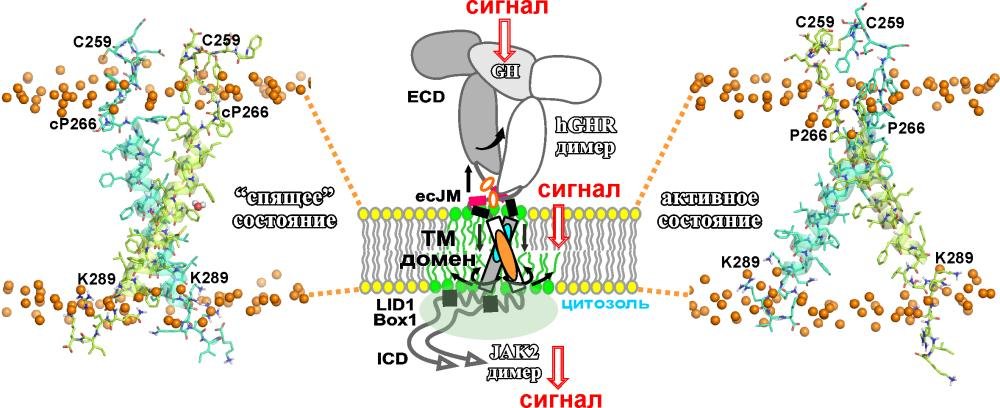
На основе структурно-динамических ЯМР-исследований детально описаны аллостерические конформационные перестройки и межмолекулярные взаимодействия трансмембранного домена рецептора гормона роста человека, hGHR, инициированные связыванием лиганда. В результате был предложен молекулярный механизм передачи сигнала рецептором hGHR.
- 2018 Structural basis of the signal transduction via transmembrane domain of the human growth hormone receptor. BIOCHIM BIOPHYS ACTA 1862 (6) 1410–1420
Лаборатория моделирования биомолекулярных систем (Ефремов Р.Г.)
,Лаборатория биомолекулярной ЯМР-спектроскопии (Арсеньев А.С.)
Установлен молекулярный механизм конститутивной активации рецепторной тирозин-киназы PDGFRA, опосредованной траснмембранным доменом
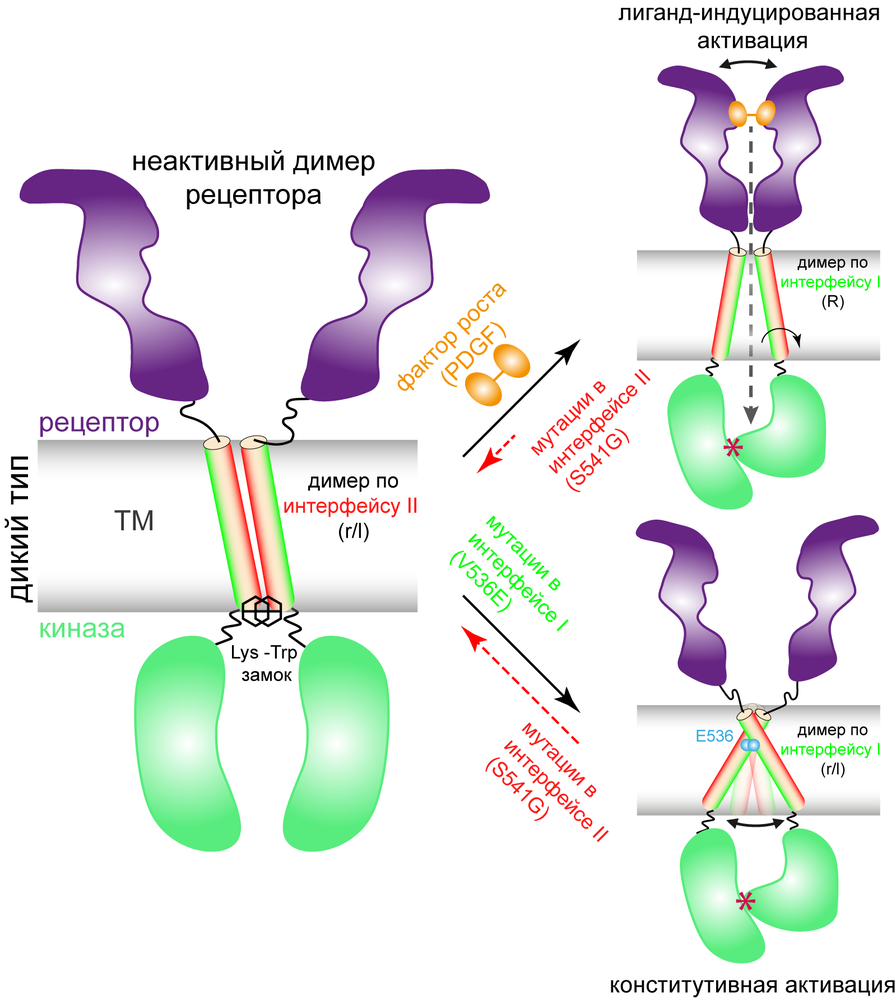
В сотрудничестве с экспериментальными группами проф. Ж.-Б. Демолина (Институт Де Дюва, Брюссель Бельгия) и проф. А. С. Арсеньева (ИБХ РАН) исследован молекулярный механизм активации рецепторных тирозинкиназ, опосредованной трансмембранным (ТМ) доменом, на примере рецептора фактора роста тромбоцитов (PDGFRA) и его онкогенного мутанта V536E. Разработанная уникальная вычислительная платформа позволила просканировать все возможные позиции в ТМ-спирали рецептора и идентифицировать функциональные мутации для дикого типа и онкогенного мутанта, а также выявить взаимосвязь между активностью рецептора и димеризацией ТМ доменов по нескольким доступным участкам взаимодействия (интерфейсам). Найдены и протестированы на культуре клеток новая активирующая мутация I537D для дикого типа, а также мутация S541G, элиминирующая повышенную конститутивную активность онкогенного мутанта V536E.
- 2019 Atomistic mechanism of the constitutive activation of PDGFRA via its transmembrane domain. BIOCHIM BIOPHYS ACTA 1863 (1) 82–95
Лаборатория моделирования биомолекулярных систем (Ефремов Р.Г.)
,Лаборатория оптической микроскопии и спектроскопии биомолекул (Феофанов А.В.)
,Лаборатория лиганд-рецепторных взаимодействий (Кашеверов И.Е.)
Дизайн биоактивных пептидов комбинированием мотивов
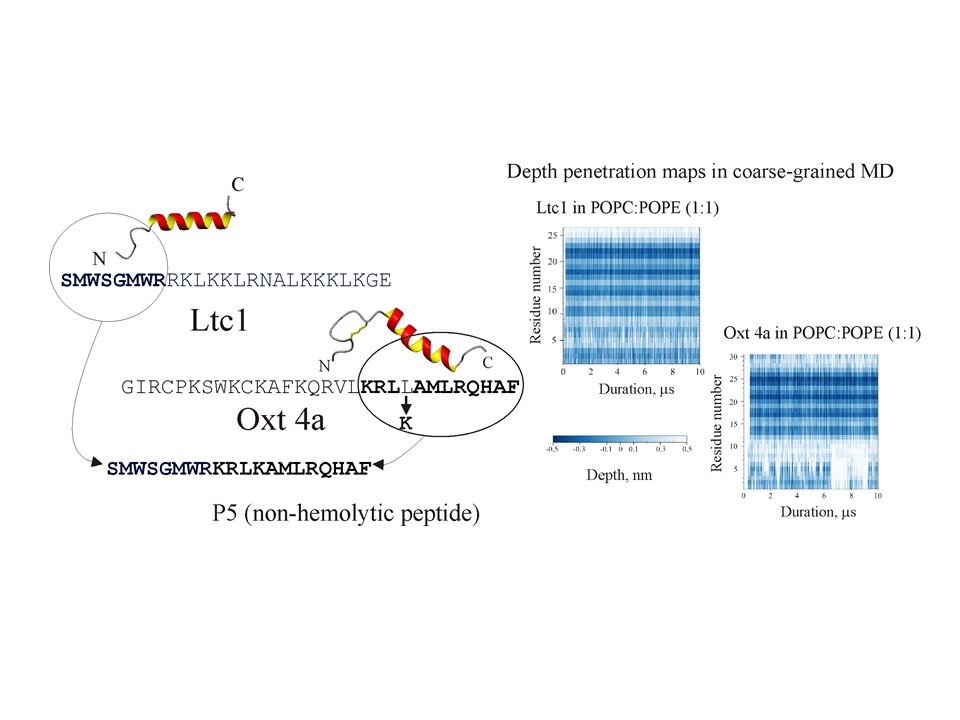
Дизайн антимикробного пептида с пониженной гемолитической активностью на основе комбинирования фрагментов (мотивов) пептидов из яда пауков. С помощью молекулярной динамики в крупнозернистом приближении оценена глубина проникновения природных пептидов (Ltc1, Oxt 4a) из яда паука в мембрану эритроцитов. Искусственный пептид (P5) сформирован из фрагментов, не проникающих глубоко в такую мембрану (в круге - см. Рис.), или пептида, глубоко проникающего, и, следовательно, гемолитически активного, но с пониженной за счет аминокислотной замены L/K степенью гидрофобности (в эллипсе).
- 2018 The role of hydrophobic /hydrophilic balance in the activity of structurally flexible vs rigid cytolytic polypeptides and analogues developed on their basis. Expert Rev Proteomics 15 (11) 873–886
- 2018 Improving therapeutic potential of antibacterial spider venom peptides: coarse-grain molecular dynamics guided approach. Future Med Chem 10 (19) 2309–2322
Лаборатория моделирования биомолекулярных систем (Ефремов Р.Г.)
Механизм самопроизвольного прохождения вискумина А через мембрану
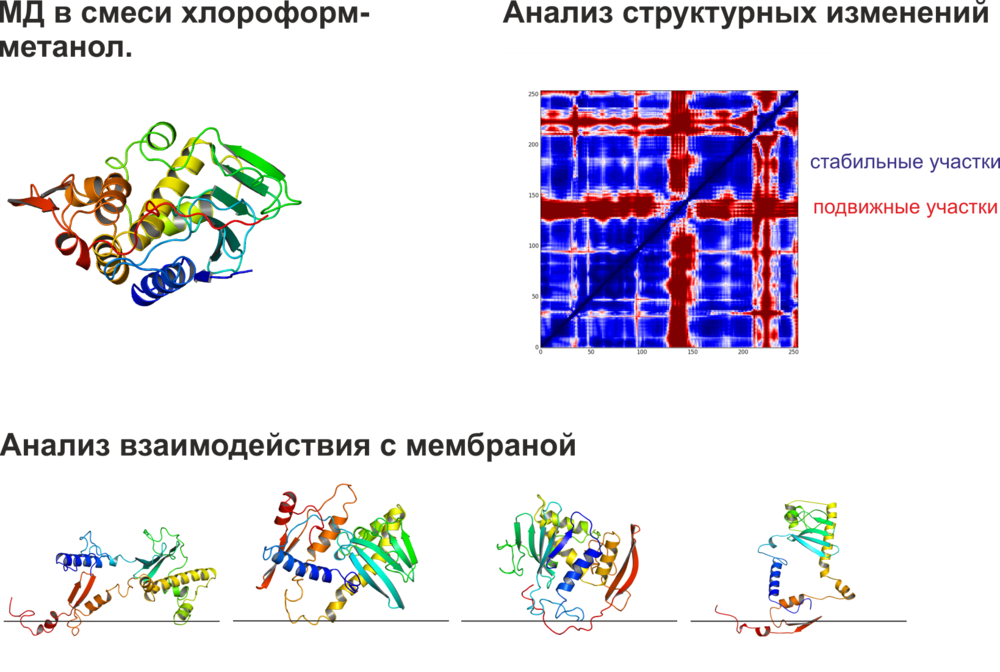
На примере цепи A токсина вискумин исследован in silico один из возможных механизмов спонтанного прохождения водорастворимых белков через мембрану. Показано, что в ходе молекулярной динамики в смеси хлороформ/метанол вискумин A «выворачивается» наружу: на поверхности белка оказываются гидрофобные участки, изначально находившиеся внутри глобулы. При этом увеличивается длина участков регулярной вторичной структуры белка. Конформационный поиск методом Монте-Карло в присутствии неявно заданной мембраны показал, что полученные структуры способны связываться с мембраной, в отличие от структуры в воде.
- 2018 Specific refolding pathway of viscumin A chain in membrane-like medium reveals a possible mechanism of toxin entry into cell. Sci Rep
Лаборатория оптической микроскопии и спектроскопии биомолекул (Феофанов А.В.)
,Лаборатория моделирования биомолекулярных систем (Ефремов Р.Г.)
,Группа анализа структуры мембранных белков in silico (Чугунов А.О.)
,Группа нанобиоинженерии (Некрасова О.В.)
,Лаборатория молекулярных инструментов для нейробиологии (Василевский А.А.)
MeKTx11-1, селективный пептидный блокатор калиевого канала Kv1.2 из яда скорпиона M. eupeus: структурные основы селективности
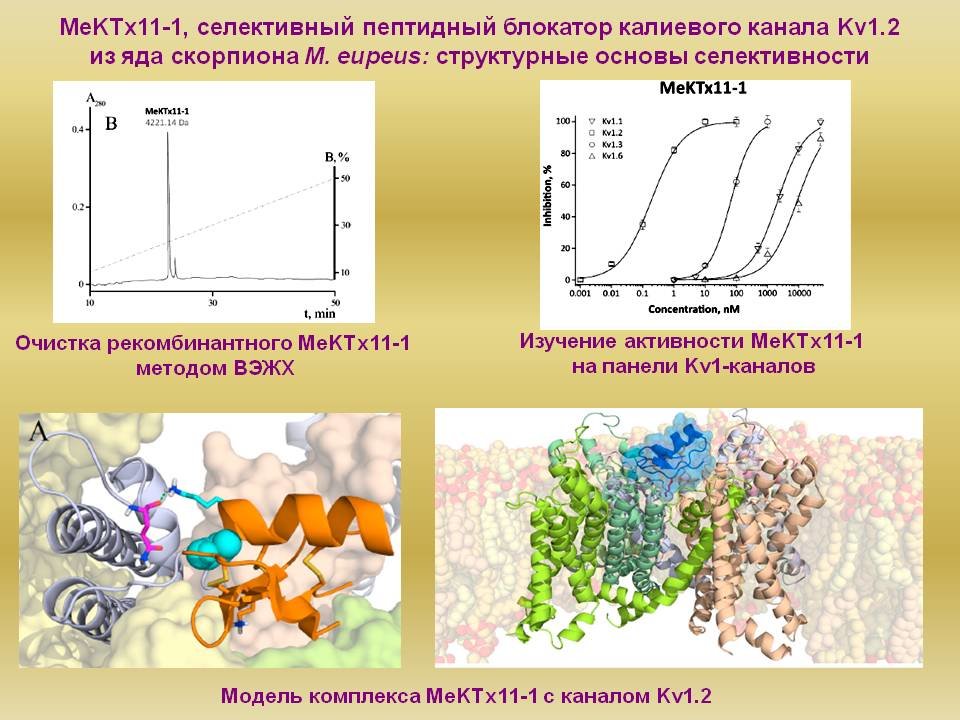
А.В. Феофанов (Лаборатория оптической микроскопии и спектроскопии биомолекул), О.В. Некрасова, К.С. Кудряшова (Отдел биоинженерии, группа нанобиоинженерии), А.А. Василевский, А.И. Кузьменков, А.М. Гиголаев (Лаборатория молекулярных инструментов для нейробиологии), А.О. Чугунов, В.М. Табакмахер, Р. Г. Ефремов (Группа анализа структуры мембранных белков in silico, Лаборатория моделирования биомолекулярных систем).
Исследован уникальный высокоаффинный и высокоселективный пептидный блокатор канала Kv1.2 - MeKTx11-1 из яда скорпиона Mesobuthus eupeus. Пептид MeKTx11-1 и его мутантные аналоги были получены в рекомбинантной форме, их рецептор-связывающая активность изучена на панели Kv1-каналов. Проведено молекулярное моделирование взаимодействия этих пептидов с каналом Kv1.2, установлены ключевые структурные детерминанты этого взаимодействия. Пептид MeKTx11-1 является новым эффективным молекулярным инструментом для нейробиологии, позволяющим идентифицировать и изучать активность канала Kv1.2 в присутствии различных изоформ Kv1-каналов.
В сотрудничестве с S.Peigneur, J.Tytgat из University of Leuven, Бельгия и А.Ф. Фрадковым из ООО Евроген.
- 2018 K1.2 channel-specific blocker from Mesobuthus eupeus scorpion venom: Structural basis of selectivity. Neuropharmacology 143 228–238
Лаборатория оптической микроскопии и спектроскопии биомолекул (Феофанов А.В.)
,Группа структурной биологии ионных каналов (Шенкарёв З.О.)
,Группа биоинженерии нейромодуляторов и нейрорецепторов (Люкманова Е.Н.)
Трехпетельные белки млекопитающих защищают от рака
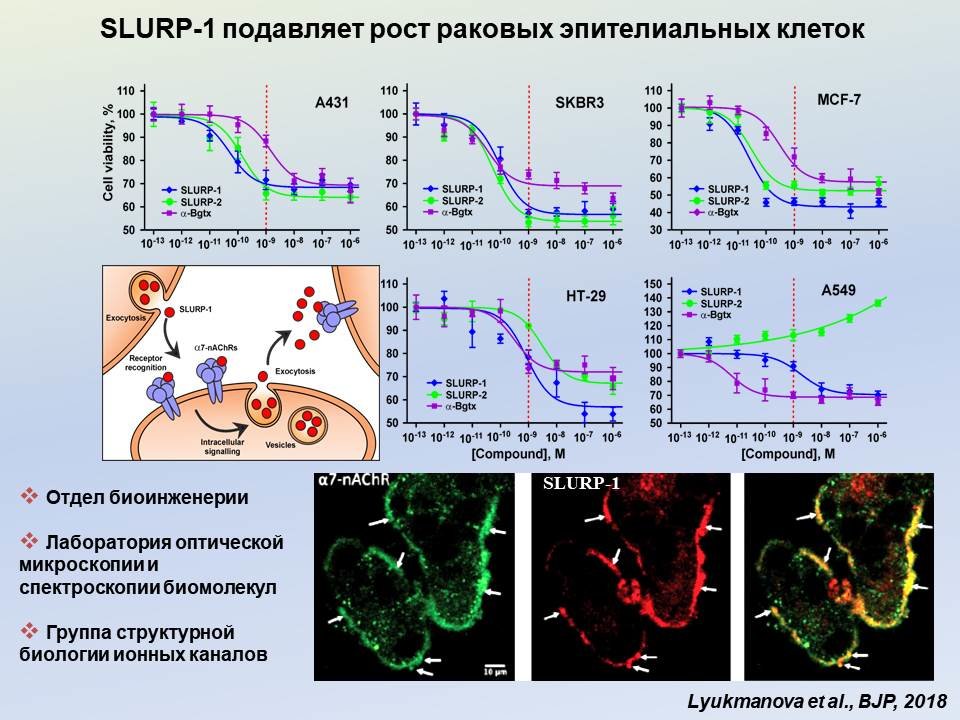
Ефременко А.В., Шаронов Г.В., Феофанов А.В. (Лаборатория оптической микроскопии и спектроскопии биомолекул), Люкманова Е.Н., Бычков М.Л., Шулепко М.А., Кульбатский Д.С., Долгих Д.А., Кирпичников М.П. (Группа биоинженерии нейромодуляторов и нейрорецепторов, Отдел биоинженерии), Шенкарев З.О (Группа структурной биологии ионных каналов).
Обнаружено, что секретируемый белок человека SLURP-1, который экспрессируется в эпителиальных клетках и контролирует их пролиферацию и миграцию, подавляет рост раковых клеток эпителиального происхождения. Воздействие SLURP-1 на раковые клетки характеризуется положительной обратной связью: экзогенный (рекомбинантный) SLURP-1 связывается с никотиновыми ацетилхолиновыми рецепторами α7 типа и запускает каскад сигналов, который активирует секрецию эндогенного SLURP-1, быстро повышая его концентрацию в межклеточном пространстве и усиливая антипролиферативное действие. Концентрации SLURP-1, подавляющие деление опухолевых клеток, не влияют на рост нормальных клеток.
- 2018 Human secreted proteins SLURP-1 and SLURP-2 control the growth of epithelial cancer cells via interactions with nicotinic acetylcholine receptors. Br J Pharmacol 175 (11) 1973–1986
Группа структурной биологии ионных каналов (Шенкарёв З.О.)
,Группа биоинженерии нейромодуляторов и нейрорецепторов (Люкманова Е.Н.)
,Лаборатория молекулярных инструментов для нейробиологии (Василевский А.А.)
Взаимодействие вольт-сенсорного токсина Hm-3 с потенциал-чувствительным доменом Na+ канала Nav1.4: структурный взгляд на связывание опосредованное мембраной
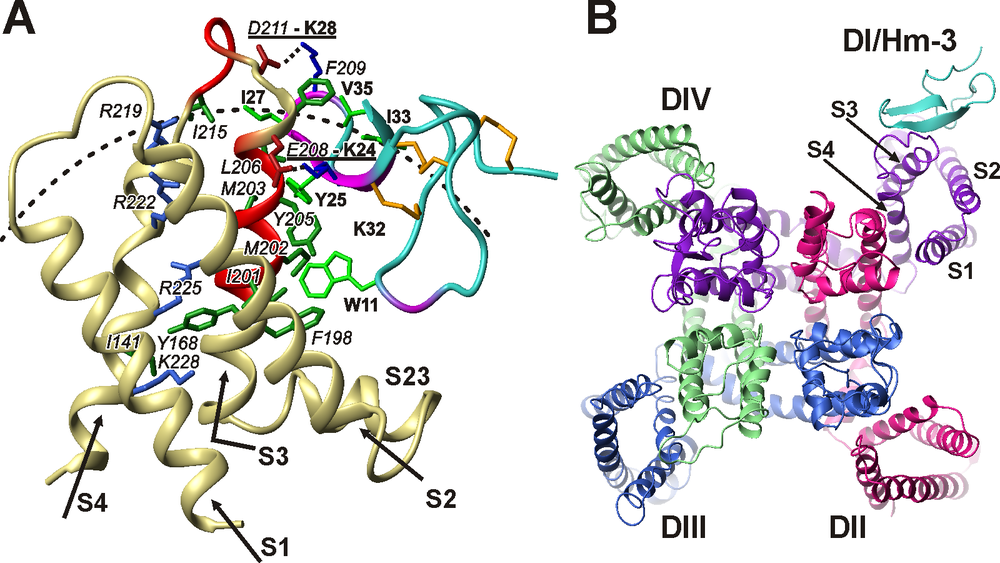
Потенциалозависимые Na+ каналы (Nav) играют важнейшую роль в функционировании сердечно-сосудистой, мышечной и нервной систем. Некоторые мутации вызывают токи утечки через потенциал-чувствительные домены (VSD) каналов Nav, которые приводят к различным заболеваниям. Гипокалиемический периодический паралич (HypoPP) 2 типа вызван мутациями в сегментах S4 VSD в канале NaV1.4 скелетных мышц человека. Вольт-сенсорный токсин Hm-3 из яда паук Heriaeus melloteei подавляет токи утечки через такие мутантные каналы. Для изучения механизма взаимодействия Hm-3 и канала NaV1.4 мы сосредоточились на исследовании изолированного домена VSD-I с помощью ЯМР-спектроскопии в среде имитирующей мембрану. Модель комплекса Hm-3/VSD-I была построена методом белок-белкового докинга с использованием ограничений ЯМР. Токсин изначально закрепляется на поверхности мембраны, а затем образует комплекс с петлей S3b-S4 VSD-I. Связывание Hm-3 блокирует движение спирали S4 – датчика-потенциала и индуцирует аллостерические изменения, которые препятствуют появлению токов утечки. Наша работа является первым структурным ЯМР-исследованием взаимодействия между вольт-сенсорными токсинами и каналами Nav.
- 2018 Spider toxin inhibits gating pore currents underlying periodic paralysis. Proc Natl Acad Sci U S A 115 (17) 4495–4500
Группа анализа структуры мембранных белков in silico (Чугунов А.О.)
,Лаборатория оптической микроскопии и спектроскопии биомолекул (Феофанов А.В.)
,Группа нанобиоинженерии (Некрасова О.В.)
,Лаборатория молекулярных инструментов для нейробиологии (Василевский А.А.)
Механизм селективного действия блокатора калиевого канала Kv1.2 — пептида MeKTx11-1 из яда скорпиона
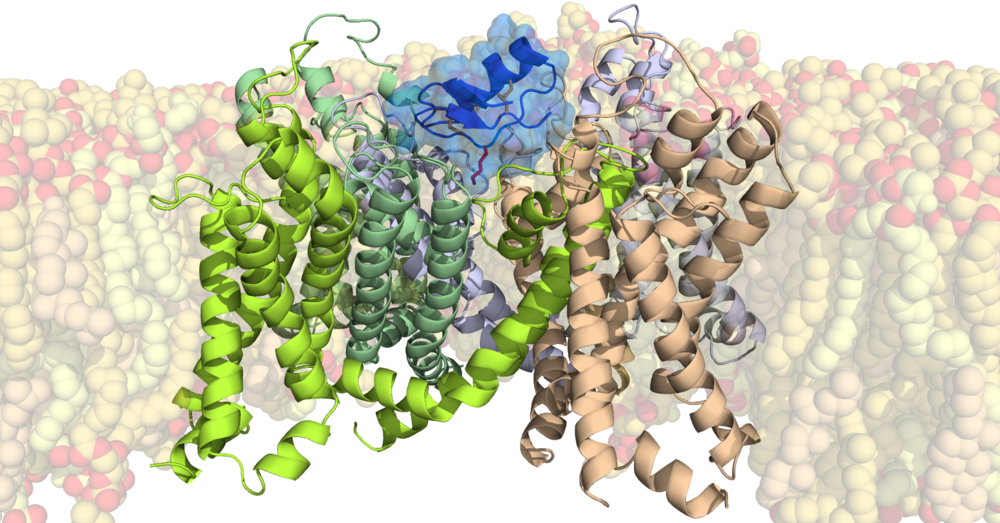
Лаборатория молекулярных инструментов для нейробиологии систематически изучает яды членистоногих, выделяя из них пептиды, специфично и с высокой активностью модулирующие активность разнообразных ионных каналов. Яд скорпионов особенно богат пептидными поровыми блокаторами потенциал-чувствительных калиевых каналов (Kv), и это разнообразие мы отразили в ранее созданной базе данных таких пептидов Kalium.
В сотрудничестве с Лабораторией оптической микроскопии и спектроскопии биомолекул и Группой нанобиоинженерии с применением разработанной ранее уникальной системы скрининга из яда скорпиона Mesobuthus eupeus был выделен пептидный блокатор канала Kv1.2 MeKTx11-1, связывающийся с высокой аффинностью (IC50 ≈0,2 нМ) и специфичностью (эффект на каналах Kv1.1, 1.3 и 1.6 проявляется в концентрациях в сотни раз выше). Этот пептид отличается всего двумя остатками от родственного MeKTx11-3, обладающего существенно меньшей селективностью в отношении Kv1.2.
В Группе анализа структуры мембранных белков in silico провели молекулярное моделирование взаимодействия этих двух пептидов с каналом Kv1.2, помещенным в явно заданную бислойную липидную мембрану, и объяснили механизм селективного действия MeKTx11-1. Выработанная методика анализа позволит создавать новые селективные лиганды Kv и других каналов, востребованные как в качестве молекулярных инструментов для изучения нервной системы, так и для медицины.
- 2018 K1.2 channel-specific blocker from Mesobuthus eupeus scorpion venom: Structural basis of selectivity. Neuropharmacology 143 228–238
Отдел геномики и постгеномных технологий
Лаборатория структуры и функций генов человека (Свердлов Е.Д.)
Роль белка PIWIL2 в образовании герминогенных опухолей
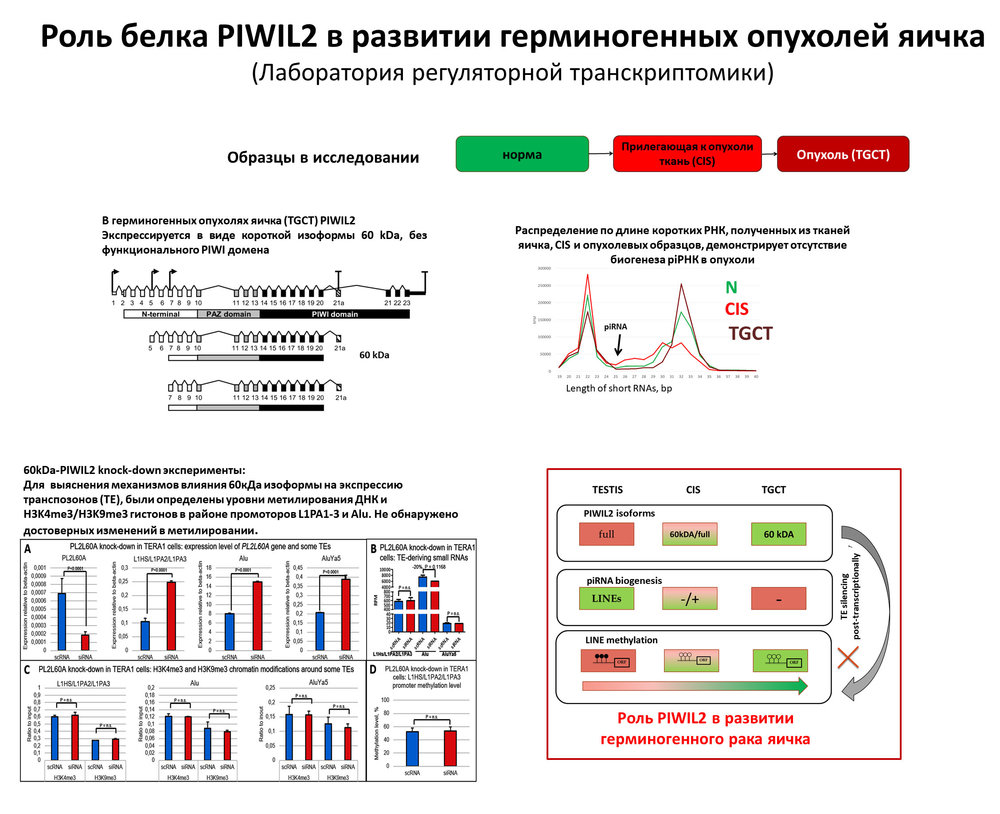
Эволюционно высоко консервативные белки семейства PIWIL участвуют во многих клеточных процессах, сопровождающих канцерогенез. Их функционирование осуществляется в комплексе с короткими некодирующими РНК (piRNA), которые определяют стабильность геномов, препятствуя экспрессии и возможным перемещениям мобильных элементов. Мы исследовали функции PIWI/piRNA системы в герминальных клетках яичек, а также в динамике образования герминогенных опухолей, и показали, что в опухолях экспрессируется редуцированная, 60 кДа, форма белка PIWIL2. При этом в опухолевых клетках отсутствует биогенез piRNA, а короткая изоформа PIWIL2 способна подавлять экспрессию молодых семейств LINE и SINE пост-транскрипционно, что может обеспечивать преимущества для опухолевого роста за счет поддержания стабильности ее генома.
- 2018 Assessment of piRNA biogenesis and function in testicular germ cell tumors and their precursor germ cell neoplasia in situ. BMC Cancer 18 (1) 20
Лаборатория структуры и функций генов человека (Свердлов Е.Д.)
Новая противоопухолевая комбинация на основе бинарной системы векторов для опухолеспецифичной экспрессии гена-убийцы FCU1
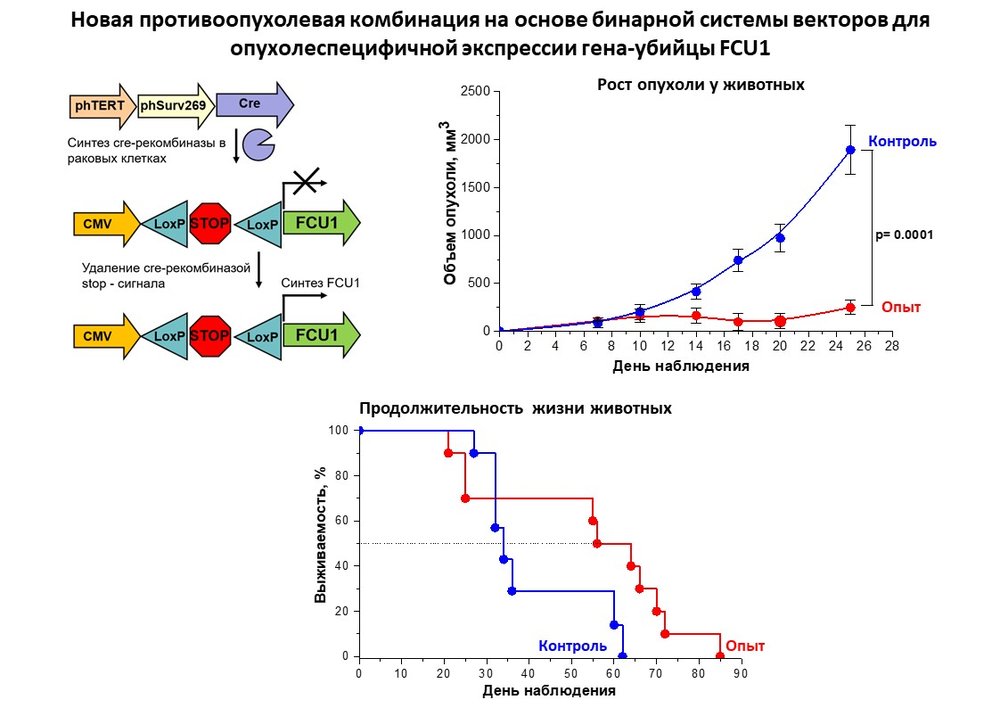
Несмотря на прогресс в области лечения онкологических заболеваний, рак остается второй ведущей причиной смертности после сердечно-сосудистых заболеваний. Поэтому поиск новых эффективных и низкотоксичных подходов к лечению рака – чрезвычайно актуальная задача. Генная терапия рака, в основе которой лежит доставка в опухоль генов, вызывающих ингибирование роста или гибель раковых клеток – одно из перспективных направлений. Была создана генотерапевтическая комбинация, в которой для контроля экспрессии суицидного гена FCU1 была использована модифицированная бинарная система Cre–LoxP и созданный нами ранее искусственный промотор PhTSurv269. В условиях модели аденокарциномы толстой кишки мыши был выявлен высокий терапевтический потенциал исследуемого комплекса.
- 2018 The antitumor efficacy of a complex based on two-vector system for co-expression of the suicide gene FCU1 and Cre-recombinase. 483 (3) 1–3
- 2018 Противоопухолевая эффективность комплекса на основе бинарной системы векторов для совместной экспрессии гена-убийцы Fcu1 и Cre-рекомбиназы. 483 (3) 1–3
Лаборатория биофотоники (Лукьянов К.А.)
,Лаборатория методов иммуносеквенирования (Чудаков Д.М.)
Фотопереключаемые красные флуоресцентные белки для наноскопии в живых клетках
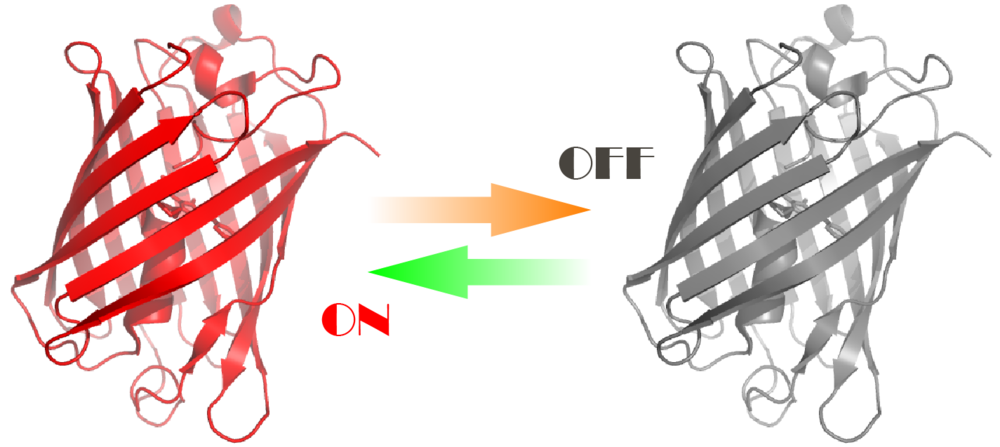
Мы получили новые обратимо фотопереключаемые красные флуоресцентные белки на основе белка FusionRed. Флуоресценция этих белков, rsFusionRed1, 2 и 3, может быть “выключена” и “включена” облучением оранжевым и зеленым светом, соответственно. Это позволяет избежать облучения фототоксичным фиолетовым и синим светом, обычно используемым для других фотопереключаемых белков. Благодаря высокой яркости, высокой фотостабильности, быстрому фотопереключению и низкой фототоксичности возбуждающего света белки rsFusionRed представляют собой прекрасные метки для наноскопии живых клеток.
- 2018 Fast reversibly photoswitching red fluorescent proteins for live-cell RESOLFT nanoscopy. Nat Methods 15 (8) 601–604
Отдел молекулярной нейроиммунной сигнализации
Лаборатория молекулярной токсинологии (Уткин Ю.Н.)
,Лаборатория лиганд-рецепторных взаимодействий (Кашеверов И.Е.)
,Лаборатория молекулярной диагностики (Завриев С.К.)
,Отдел «Учебно-научный центр» (Овчинникова Т.В.)
Первые рекомбинантные трехпетельные токсины гадюк – антагонисты никотиновых холинорецепторов мышечного и нейронного типа
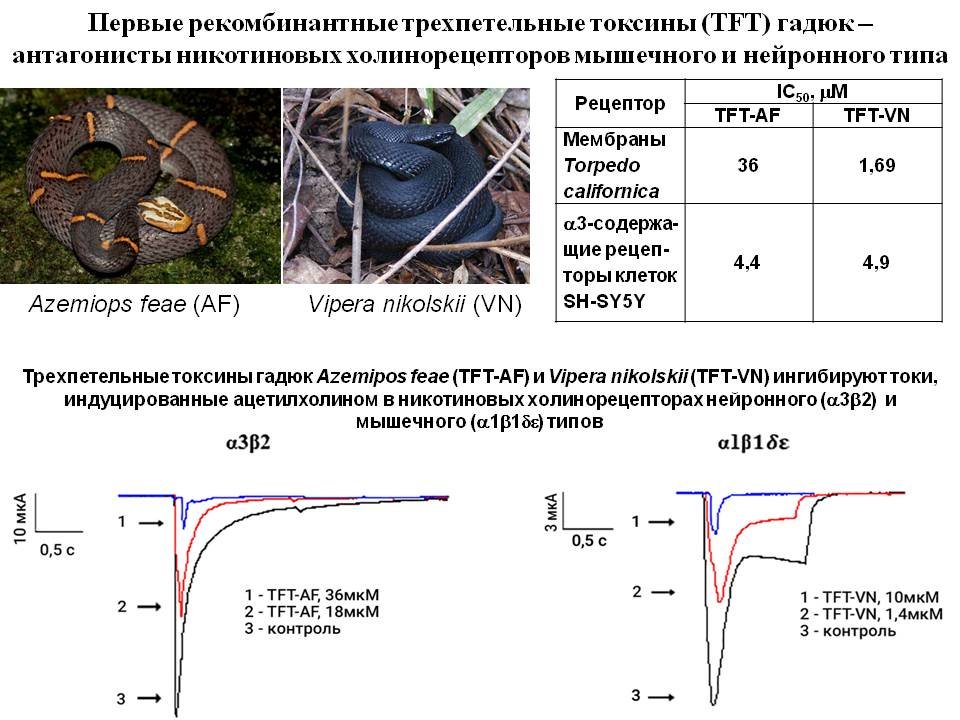
Одним из основных компонентов ядов змей семейства Elapidae являются трехпетельные токсины, которые обладают различными видами биологической активности, включая ингибирование синаптической передачи за счет блокирования холинорецепторов никотинового типа. Трехпетельные токсины до сих пор не обнаружены в ядах змей семейства Viperidae, хотя кодирующие их мРНК найдены в ядовитых железах змей этого семейства. Нами впервые проведена экспрессия в клетках E. coli генов двух трехпетельных токсинов TFT-AF и TFT-VN, последовательности которых установлены на основании последовательностей кДНК из ядовитых желез гадюк Azemiops feae и Vipera nikolskii, соответственно. Исследование биологической активности полученных токсинов проведено с помощью методов электрофизиологии, кальциевого имиджинга и радиолигандного анализа. Нами впервые показано, что трехпетельные токсины гадюк являются антагонистами никотиновых холинорецепторов как нейронного, так и мышечного типа.
- 2018 The First Recombinant Viper Three-Finger Toxins: Inhibition of Muscle and Neuronal Nicotinic Acetylcholine Receptors. Dokl Biochem Biophys 479 (1) 127–130
Лаборатория лиганд-рецепторных взаимодействий (Кашеверов И.Е.)
Характеристика сайтов связывания "анальгетических" конотоксинов на никотиновом рецепторе и его моделях
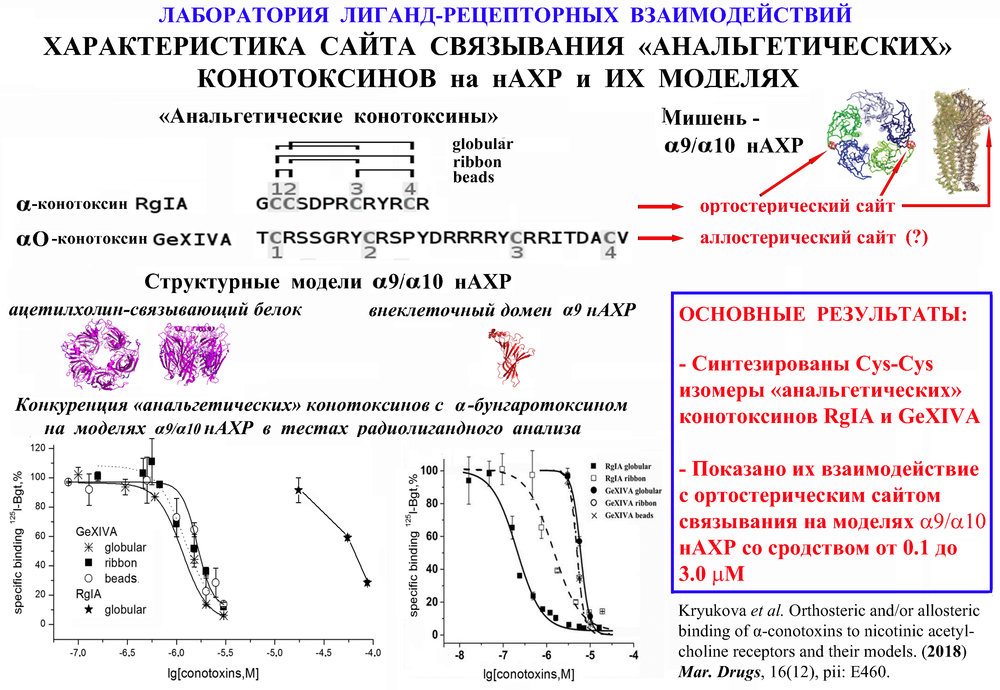
Синтезирована линейка Cys-Cys изомеров «анальгетических» конотоксинов RgIA и GeXIVA, действующих через орто- или аллостерический сайты связывания α9/α10 никотинового холинорецептора, соответственно. Изучение их методом прямого или конкурентного радиолигандного анализа на водорастворимых моделях этого рецептора – ацетилхолин-связывающем белке и рекомбинантном внеклеточном домене α9 субъединицы рецептора, показало, что они эффективно с микромолярным сродством взаимодействуют только с ортостерическим сайтом связывания этих моделей.
- 2018 Orthosteric and/or Allosteric Binding of α-Conotoxins to Nicotinic Acetylcholine Receptors and Their Models. Mar Drugs 16 (12)
Отдел биоинженерии
Лаборатория инженерии белка (Долгих Д.А.)
Функциональные исследования ретинального белка Exiguobacterium sibiricum (ESR)
Ретиналь-содержащий белок Exiguobacterium sibiricum (ESR) представляет собой светозависимую протонную помпу, обладающую уникальной структурной особенностью – наличием остатка лизина в положении, соответствующем внутрибелковому донору протонов для основания Шиффа. Впервые получены и исследованы производные ESR, содержащие синтетические аналоги ретиналя. С помощью прямого электрометрического метода изучена кинетика образования светоиндуцированного мембранного потенциала протеолипосомами со встроенным ESR, а также его мутантным вариантом K96A. Показано, что при нейтральных и щелочных значениях рН для ESR дикого типа наблюдается положительный фотоэлектрический ответ, соответствующий переносу протонов во внешнюю среду. Замена остатка К96 сопровождается исчезновением миллисекундной электрогенной фазы, которая связана с репротонированием основания Шиффа. Впервые показано, что пониженная эффективность транспорта протонов в мутанте K96A объясняется не только замедлением фотоцикла, но и повышением вклада обратных реакций.
Cовместно с Биологическим факультетом МГУ, ИБХФ РАН и МФТИ
- 2018 Elimination of proton donor strongly affects directionality and efficiency of proton transport in ESR, a light-driven proton pump from Exiguobacterium sibiricum. BIOCHIM BIOPHYS ACTA 1860 1–11
- 2018 The effect of the chromophoric group modification on the optical properties of retinal proteins. MENDELEEV COMMUN 28 (4) 406–408
Группа биоинженерии нейромодуляторов и нейрорецепторов (Люкманова Е.Н.)
,Лаборатория оптической микроскопии и спектроскопии биомолекул (Феофанов А.В.)
,Группа структурной биологии ионных каналов (Шенкарёв З.О.)
,Лаборатория инженерии белка (Долгих Д.А.)
Трехпетельные белки млекопитающих защищают от рака
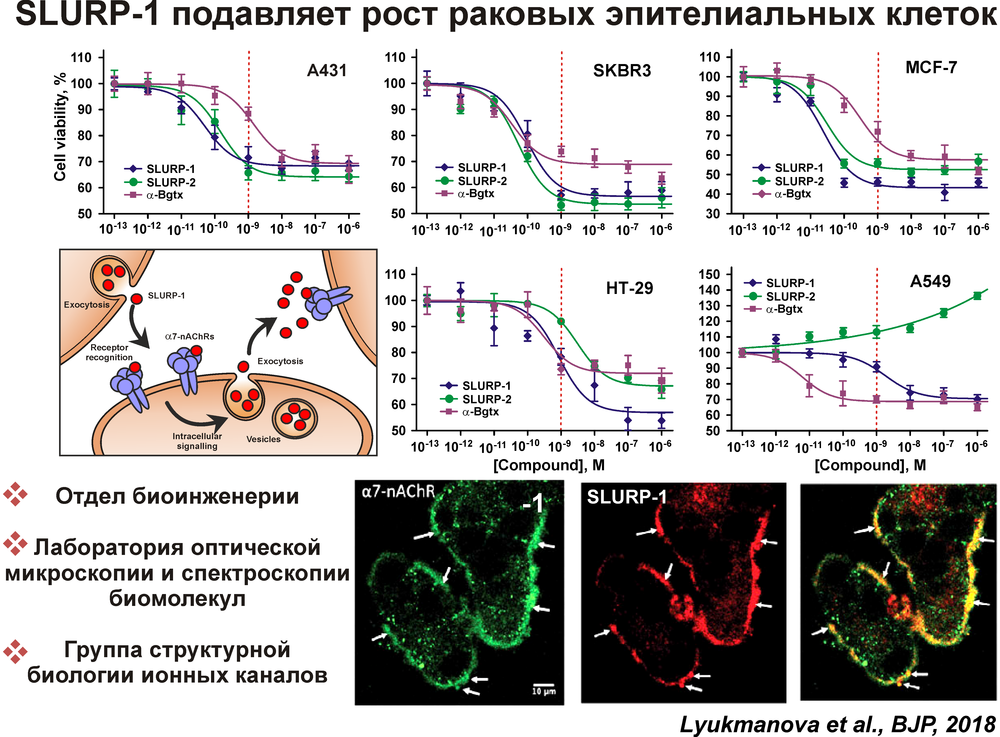
Обнаружено, что секретируемый белок человека SLURP-1, который экспрессируется в эпителиальных клетках и контролирует их пролиферацию и миграцию, подавляет рост раковых клеток эпителиального происхождения.
Воздействие SLURP-1 на раковые клетки характеризуется положительной обратной связью: экзогенный (рекомбинантный) SLURP-1 связывается с никотиновыми ацетилхолиновыми рецепторами α7 типа на поверхности клеток и запускает каскад сигналов, который мгновенно активирует секрецию эндогенного SLURP-1 из внутриклеточных депо, быстро повышая его концентрацию в межклеточном пространстве и усиливая антипролиферативное действие.
Концентрации SLURP-1, подавляющие деление опухолевых клеток, не влияют на рост нормальных клеток.
- 2018 Human secreted proteins SLURP-1 and SLURP-2 control the growth of epithelial cancer cells via interactions with nicotinic acetylcholine receptors. Br J Pharmacol 175 (11) 1973–1986
Группа нанобиоинженерии (Некрасова О.В.)
,Лаборатория оптической микроскопии и спектроскопии биомолекул (Феофанов А.В.)
,Группа анализа структуры мембранных белков in silico (Чугунов А.О.)
,Лаборатория молекулярных инструментов для нейробиологии (Василевский А.А.)
MeKTx11-1, селективный пептидный блокатор калиевого канала Kv1.2 из яда скорпиона M. eupeus: структурные основы селективности

Оксана В. Некрасова, К.С. Кудряшова (Отдел биоинженерии, группа нанобиоинженерии), А.А. Василевский, А.И. Кузьменков, А.М. Гиголаев (Лаборатория молекулярных инструментов для нейробиологии), А.О. Чугунов, В.М. Табакмахер, Р. Г. Ефремов (Группа анализа структуры мембранных белков in silico, Лаборатория моделирования биомолекулярных систем), А.В. Феофанов (Лаборатория оптической микроскопии и спектроскопии биомолекул).
Исследован уникальный высокоаффинный и высокоселективный пептидный блокатор канала Kv1.2 - MeKTx11-1 из яда скорпиона Mesobuthus eupeus. Пептид MeKTx11-1 и его мутантные аналоги были получены в рекомбинантной форме, их рецептор-связывающая активность изучена на панели Kv1-каналов. Проведено молекулярное моделирование взаимодействия этих пептидов с каналом Kv1.2, установлены ключевые структурные детерминанты этого взаимодействия. Пептид MeKTx11-1 является новым эффективным молекулярным инструментом для нейробиологии, позволяющим идентифицировать и изучать активность канала Kv1.2 в присутствии различных изоформ Kv1-каналов.
В сотрудничестве с S.Peigneur, J.Tytgat из University of Leuven, Бельгия и А.Ф. Фрадков из ООО Евроген.
- 2018 K1.2 channel-specific blocker from Mesobuthus eupeus scorpion venom: Structural basis of selectivity. Neuropharmacology 143 228–238
Отдел молекулярной нейробиологии
Лаборатория нейрорецепторов и нейрорегуляторов (Козлов С.А.)
,Лаборатория биофармацевтики (Дейгин В.И.)
,Лаборатория биомолекулярной ЯМР-спектроскопии (Арсеньев А.С.)
,Лаборатория моделирования биомолекулярных систем (Ефремов Р.Г.)
В лекарственном растении Laurus nobilis обнаружен протон-независимый активатор кислото-чувствительных каналов ASIC3 с необычными фармакологическими свойствами.
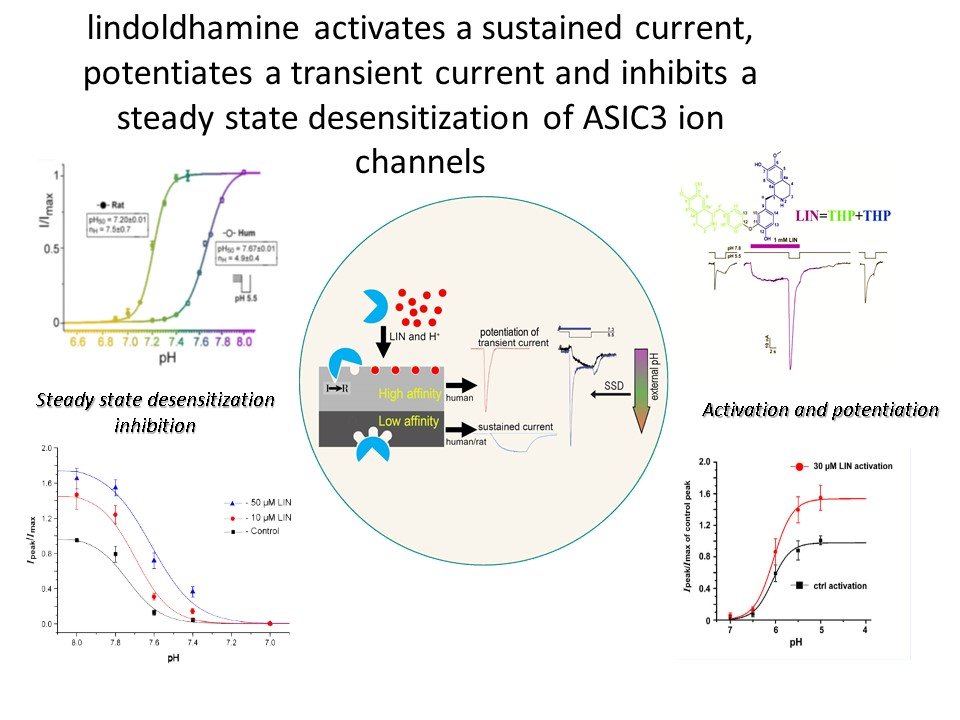
Целенаправленный поиск новых лигандов к ионным каналам семейства ASIC привел к обнаружению в листьях благородного лавра алкалоида линдолдхамин, который может активировать канал ASIC3 при физиологических значениях pH. Было продемонстрировано, что закисление внеклеточной среды, которое в норме приводит к активации ионного канала, не является необходимым условием для открытия, как человеческой, так и крысиной изоформы ASIC3 канала. Электрофизиологические исследования на гетерологически экспрессированных ионных каналах ASIC3 выявили различия в модуляции активности человеческой и крысиной изоформы линдолдхамином. С помощью различных протоколов было показано, что связывание линдолдхамина с человеческой изоформой ASIC3 канала в закрытом состоянии приводит к 2 кратному росту амплитуды транзиентного тока в ответ на кислотный рН стимул; при этом на крысиную изоформу ASIC3 лиганд не влиял. Протон независимая активация крысиного канала также была существенно ниже по амплитуде регистрируемого тока. В итоге были показаны существенные фармакологические отличия каналов ASIC3 человека и крысы при их взаимодействии с новым алколоидом, что еще раз доказывает неоднозначность возможной интерпретации данных, получаемых в тестировании на животных моделях, при разработке лекарственных средств для людей. Уникальные фармакологические свойства линдолдхамина позволяют позиционировать его как новый инструмент для изучения активности каналов ASIC, и для изучения синаптической пластичности нервной системы в целом, так как решающая роль этих каналов в этом процессе давно доказана. Уникальным свойством нового лиганда является способность конкурировать с протонами, вызывающими десенситизацию транзиентного тока ASIC3 канала, таким образом, что на кривой рН-зависимости десенситизации наблюдается увеличение амплитуды транзиентного тока, а не сдвиг кривой в область более кислых значений. Ни для одного известного лиганда ASIC такой эффект опубликован ранее не был.
- 2018 Proton-independent activation of acid-sensing ion channel 3 by an alkaloid, lindoldhamine, from Laurus nobilis. Br J Pharmacol 175 (6) 924–937
Лаборатория молекулярных инструментов для нейробиологии (Василевский А.А.)
,Группа структурной биологии ионных каналов (Шенкарёв З.О.)
,Группа биоинженерии нейромодуляторов и нейрорецепторов (Люкманова Е.Н.)
Токсин паука блокирует аберрантные токи в мутантных ионных каналах

Токсин из яда паука-бокохода Heriaeus melloteei может стать основой для создания лекарства от гипокалиемического периодического паралича второго типа, надежного лекарства от всех случаев которого не существует. Причиной заболевания служат мутации гена потенциал-чувствительных натриевых каналов NaV1.4, характерных для скелетных мышц. В результате мутаций эти каналы проводят аберрантные токи, мышцы оказываются неспособны отвечать на сигналы нервной системы, и развивается слабость вплоть до паралича. Токсин Hm-3 оказался способным селективно блокировать такие токи, протекающие через потенциал-чувствительных домен I мутантных каналов. Подробнее в пресс-релизе на сайте ИБХ.
- 2018 Spider toxin inhibits gating pore currents underlying periodic paralysis. Proc Natl Acad Sci U S A 115 (17) 4495–4500
Лаборатория молекулярных инструментов для нейробиологии (Василевский А.А.)
Молекулярный механизм действия ацилполиаминов – блокаторов глутаматных рецепторов
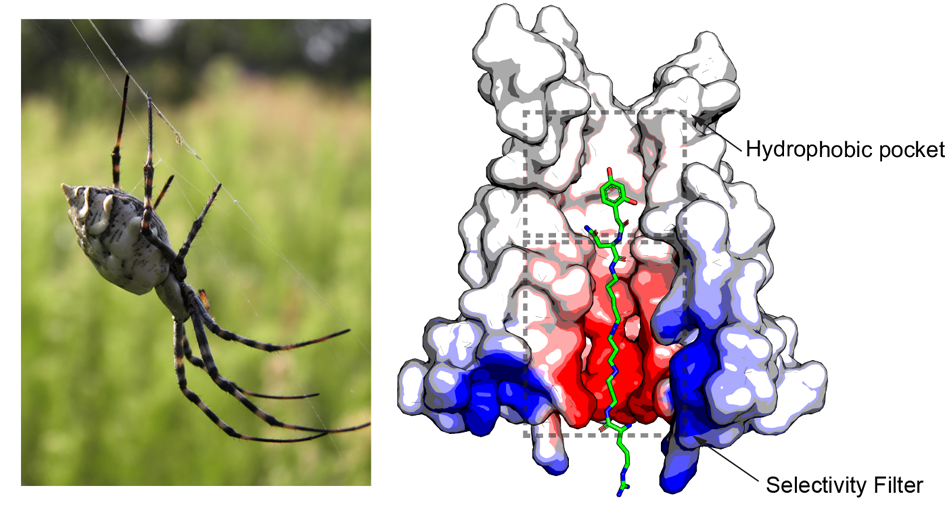
В составе яда пауков и ос находят ацилполиамины – высокоаффинные блокаторы рецепторов глутамата, главного возбуждающего нейромедиатора мозга человека. Под руководством Е.В. Гришина в 1986 г. был описан первый представитель ацилполиаминов – аргиопин из яда паука-кругопряда Argiope lobata. В 2018 г. с использованием метода криоэлектронной микроскопии изучена пространственная структура комплекса аргиопина с глутаматным рецептором. Полученные результаты позволят создать препараты для лечения нейродегенеративных заболеваний. Исследование удостоено иллюстрации на обложке журнала Neuron. Подробнее в пресс-релизе на сайте ИБХ.
- 2018 Mechanisms of Channel Block in Calcium-Permeable AMPA Receptors. Neuron 99 (5) 956–968.e4
Лаборатория молекулярных инструментов для нейробиологии (Василевский А.А.)
,Лаборатория оптической микроскопии и спектроскопии биомолекул (Феофанов А.В.)
,Группа анализа структуры мембранных белков in silico (Чугунов А.О.)
,Группа нанобиоинженерии (Некрасова О.В.)
Механизм селективного действия блокатора калиевых каналов Kv1.2
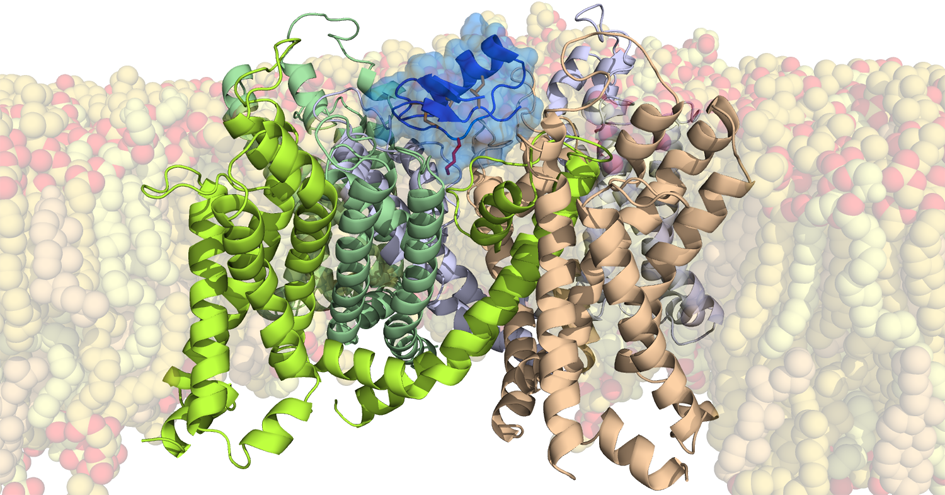
Яд скорпионов богат пептидными блокаторами потенциал-чувствительных калиевых каналов (KV), и это разнообразие мы отразили в ранее созданной базе данных таких пептидов Kalium. Из яда скорпиона Mesobuthus eupeus получен высокоаффинный и селективный блокатор каналов KV1.2, характерных для центральной нервной системы человека. С применением молекулярного моделирования и сайт-направленного мутагенеза изучен механизм селективного взаимодействия токсина и каналов.
- 2018 K1.2 channel-specific blocker from Mesobuthus eupeus scorpion venom: Structural basis of selectivity. Neuropharmacology 143 228–238
Отдел молекулярной биологии и биотехнологии растений
Лаборатория молекулярной диагностики (Завриев С.К.)
Выявление новых таксонов в составе рода Fusarium c использованием комплексного подхода

Был проведён комплексный анализ таксономического статуса и характеристик ряда коллекционных штаммов грибов рода Fusarium. Применение мультилокусного филогенетического анализа, морфологической характеристики и исследование токсинообразования позволили обнаружить ряд культур, предположительно представляющих собой новые, ранее не охарактеризованные виды. Наиболее ярким примером такого штамма является штамм F-846, первоначально идентифицированный как F.poae. Он формировал отдельную ветвь на филогенетических деревьях, построенных с использованием последовательностей 5 маркерных генов. Исследование с использованием методов ВЭЖХ продемонстрировало, что штамм F-846 способен к синтезу ДОН и его ацетилированных производных. Микроскопический анализ подтвердил, что данный штамм, по всей видимости, представляет собой новый вид рода Fusarium.
- 2018 Phylogenetic analysis and molecular typing of trichothecene-producing Fusarium fungi from Russian Collections. Acta Naturae 10 (2) 79–92
Лаборатория молекулярной биоинженерии (Мирошников К.А.)
Естественный трансмембранный домен пептидогликан-гидролазы Acinetobacter способствует бактериолитической активности фермента
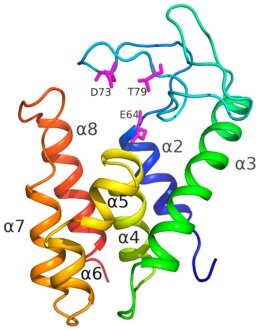
Ферменты, которые разрушают клеточную стенку бактерий, в свете возрастающей антибиотикоустойчивости патогенных микроорганизмов, считаются перспективными антибактериальными препаратами. Белки, гидролизующие пептидогликан (основной материал клеточной стенки), достаточно распространены в природе и кодируются в геномах многих бактерий (аутолизины) и бактериофагов (эндолизины). Основное препятствие для внедрения таких белков в практику – неспособность проникать через внешнюю мембрану грамотрицательных бактерий. Для осуществления этой функции либо используются дополнительные вещества, разрыхляющие мембрану, либо в полипептидную цепь фермента путем генной инженерии добавляется трансмембранный домен, обеспечивающий транспорт полученного химерного белка через мембрану бактерии. Такие белки называются «Артилизины» (ARTIficial LYSIN – «искусственный фермент»). При анализе бактериальных геномов нами был обнаружен фермент с предсказанной пептидогликан-гидролазной функцией, у которого на С-конце имеется последовательность, образующая положительно заряженную α-спираль с возможной трансмембранной функцией. Полученный рекомбинантный белок (AcLys) способен проявлять бактериолитическую активность на широком спектре грамотрицательных бактерий без добавления разрыхлителей мембран. Кристаллы белка AcLys были получены в условиях микрогравитации. Пространственная структура белка, полученная методом рентгеновской кристаллографии с разрешением 1.2 Å, показала наличие α-спирали (α8), не нарушающей целостность белковой глобулы и, вероятно, играющей активную роль в «лизисе снаружи». Исследование таких «природных артилизинов» способствуют рациональному дизайну «ферментативных антибиотиков».
- 2018 Structure of an Acinetobacter broad-range prophage endolysin reveals a C-terminal α-helix with the proposed role in activity against live bacterial cells. Viruses 10 (6)
Лаборатория экспрессионных систем и модификации генома растений (Долгов С.В.)
Испытание на лабораторных животных рекомбинантного вакцинного белка М2е-RTB, полученного в растениях Ряски малой.
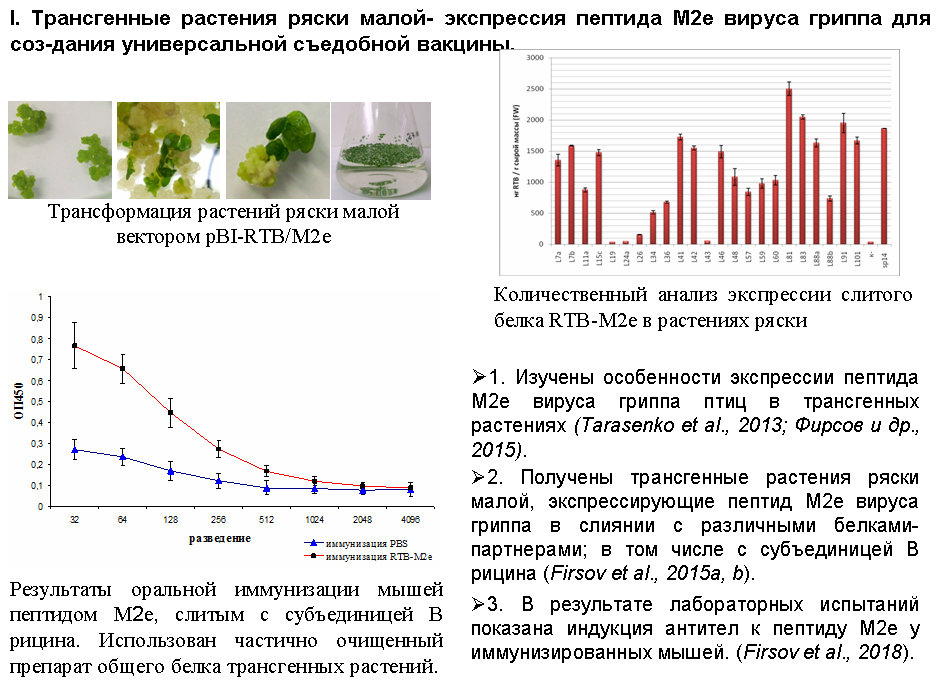
В соответствии с планом научно-исследовательской работы в 2018г был проведен молекулярно-биологический анализ растений ряски малой, и впервые получены линии ряски – продуценты рекомбинантного вакцинного белка М2е-RTB. Полученным в растениях Ряски рекомбинантным белком М2е-RTB орально иммунизировали мышей, показана индукция антител к пептиду М2е вируса гриппа птиц.
«Разработка систем синтеза рекомбинантных белков на основе растительных экспрессионных платформ (биофарминг)». № 01201352434
- 2018 Expression and Immunogenicity of M2e Peptide of Avian Influenza Virus H5N1 Fused to Ricin Toxin B Chain Produced in Duckweed Plants. Front Chem 6 22
Лаборатория экспрессионных систем и модификации генома растений (Долгов С.В.)
Изучение молекулярно-биологических механизмов и разработка методов молекулярной селекции для получения растений с/х культур, устойчивых к стрессовым факторам внешней среды и с улучшенным качеством урожая
Проведен анализ наследования трансгенных признаков в потомстве 54 первичных трансгенных линий Т0 мягкой пшеницы, содержащих гены устойчивости к гербициду bar и солевому стрессу hvnxh2 или agnhx. Выявлено 165 популяций T2-T3 наследующих гены стрессоустойчивости как гомозиготные аллели. Молекулярно-биологическим анализом подтверждена экспрессия генов солеустойчивости в гомозиготном потомстве 16-ти линий Т0. Для изучения постранскрипционного регулирования сроков созревания плодов 27 трансгенных линий яблони адаптированных к условиям ex vitro, которые содержат кассеты экспрессии для подавления синтеза этилена, были успешно привиты на подвои с целью ускорения их цветения и плодоношения.
Изучение молекулярно-биологических механизмов и разработка методов молекулярной селекции для получения растений с/х культур, устойчивых к стрессовым факторам внешней среды и с улучшенным качеством урожая, № 0101-2014-0047, № 01201352435
- 2018 Genetic transformation of einkorn (Triticum monococcum L. ssp. monococcum L.), a diploid cultivated wheat species. BMC Biotechnol 18 (1) 68
- 2018 Efficiency assessment of genetic designs with coat protein in transgene-mediated resistance against chrysanthemum virus b. Acta Hortic 1193 89–94
- 2018 Generation of transgenic rootstock plum ((Prunus pumila L. × P. salicina Lindl.) × (P. cerasifera Ehrh.)) using hairpin-RNA construct for resistance to the plum pox virus. Agronomy (Basel) 8 (1)
Лаборатория биотехнологии растений (Бурьянов Я.И.)
Устойчивость растений, экспрессирующих ген антимикробного пептида бомбинина, к фитопатогенам
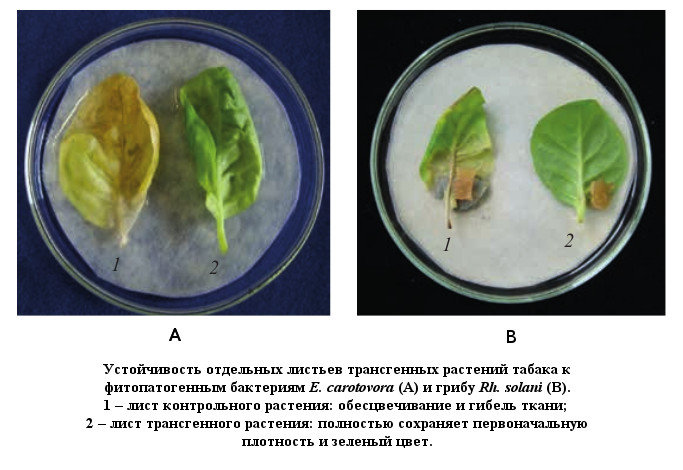
Получены и исследованы трансгенные растения с искусственным геном антимикробного пептида бомбинина. Растения проявляли устойчивость к инфекции бактерией Erwinia carotovora и грибом Rhizoctonia solani. Использование растений табака, экспрессирующих ген антимикробного пептида бомбинина, перспективно в сельскохозяйственной биотехнологии для защиты растений.
- 2018 Gene expression of the antimicrobial peptide bombinin increases the resistance of trangenic tobacco plant to phytopathogens. APPL BIOCHEM MICRO+ 54 (7) 18–23
Группа лесной биотехнологии (Шестибратов К.А.)
Раннее выявление и идентификация основных грибных фитопатогенов для оценки резистентности новых генотипов лесных древесных растений

Растущее значение лесных плантаций повышает спрос на устойчивые к фитопатогенам формы лесных древесных растений. В данной работе описан эффективный метод раннего выявления и идентификации основных грибных фитопатогенов в посадочном материале березы повислой (Betula pendula) и березы пушистой (B. pubescens) на основе оценки размеров внутренних транскрибируемых спейсеров (ITS1 и ITS2) в кластере генов рДНК 18S-5.8 S-28S, видоспецифичных для большинства микромицетов. Электрофоретический анализ локусов ITS1 и ITS2 позволил выявить преобладающие фитопатогенные виды грибов березы пушистой и повислой in planta. Этот новый молекулярно-генетический метод может быть использован для скрининга генотипов березы и других лесных древесных растений на наличие различных грибных патогенов при оценке устойчивости к болезням. Эта информация может оказаться полезной при селекции новых генотипов лесных древесных растений, в том числе трансгенных клонов с измененным составом древесины. На рисунке приведен пример двух компьютерных электрофореграмм с несколькими пиками, соответствующими фрагментам ДНК (ампликонам) полученных с образцов ДНК инфицированных листьев (А) и стеблей (В) березы повислой. Каждый пик соответствует определенному фитопатогену. Фрагменты ДНК получены при ПЦР с использованием праймеров ITS1-ITS2 и последующим разделением капиллярным гель-электрофорезом с использованием ABI Prism 310 Genetic Analyzer. Коричневые пики представляют собой фрагменты ДНК стандарта размера GeneScan™ 500 LIZ™.
- 2018 Early detection and identification of the main fungal pathogens for resistance evaluation of new genotypes of forest trees. FORESTS 9 (12)
Лаборатория молекулярных основ стрессоустойчивости растений (Тальянский М.Э.)
,Лаборатория функциональной геномики и протеомики растений (Тальянский М.Э.)
Hовый антивирусный механизм растений, основанный на взаимодействии субъядерных структур и вирусного белка.
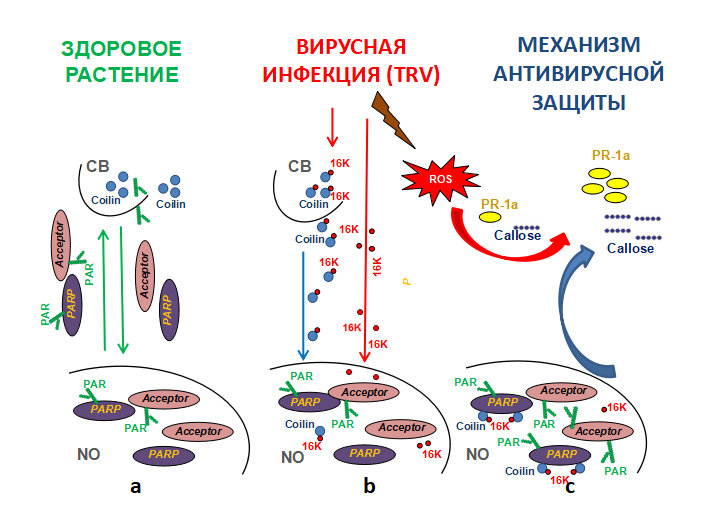
Ядрышки и тельца Кахаля (ТК) являются суб-ядерными доменами с хорошо известными ролями в метаболизме РНК и сборке РНК-белковых комплексов. Однако эти структуры также участвуют и в других важных аспектах функционирования клетки. В сотрудничестве с Институтом имени Джеймса Хаттона (Великобритания) описан ранее неизвестный механизм, с помощью которого эти структуры и их компоненты регулируют защитный ответ растения на атаку патогена. Показано, что основные белки ТК - коилин и ядрышка - фибрилларин взаимодействуют с поли(АДФ-рибозо)полимеразой (PARP) и модифицируют ее функцию, а это взаимодействие модулируется белком 16К вируса погремковости табака.
Наши результаты демонстрируют, что PARP - ядерный белок, который модифицирует функцию и субклеточную локализацию различных ядерных «целевых» белков (акцепторов) путем присоединения к ним цепей АДФ-рибозы (PAR). Для ре-активации целевых белков, PARP перемещает их из ядрышка и хроматина в ТК для удаления и рециркуляции PAR (рис.1a). При заражении вирусом погремковости табака (TRV) растение запускает защитные ответы, включающие избыточное накопление активных форм кислорода (ROS), увеличения уровня транскриптов PR-1a (патоген-ассоциированного белка, PR) и отложение каллозы (маркеры противовирусного защитного ответа). В ходе вирусной инфекции белок 16К синтезируется в цитоплазме и нацеливается на ядро клетки (рис.1б). В ядре (ТК и нуклеоплазме) вирусный белок 16К взаимодействует с коилином и релокализует его в ядрышко, что, в свою очередь приводит к задержке PARP в данном субъядерном домене, предотвращая его перемещение из ядрышка в ТК для удаления и рециркуляции PAR. Это приводит к избыточному накоплению PAR/модифицированных PAR белков и значительному усилению защитных реакций растения, таких как экспрессия гена PR-1a и отложение каллозы. По-видимому, отложение каллозы напрямую ограничивает транспорт вируса во вновь образованные листья (рис. 1в).
- 2018 The multiple functions of the nucleolus in plant development, disease and stress responses. Front Plant Sci 9 132
Отдел химической биологии гликанов и липидов
Лаборатория химии липидов (Водовозова Е.Л.)
,Лаборатория углеводов (Бовин Н.В.)
Влияние стабилизирующих компонентов в липидном бислое на целостность липосом с липофильным пролекарством в сыворотке крови человека
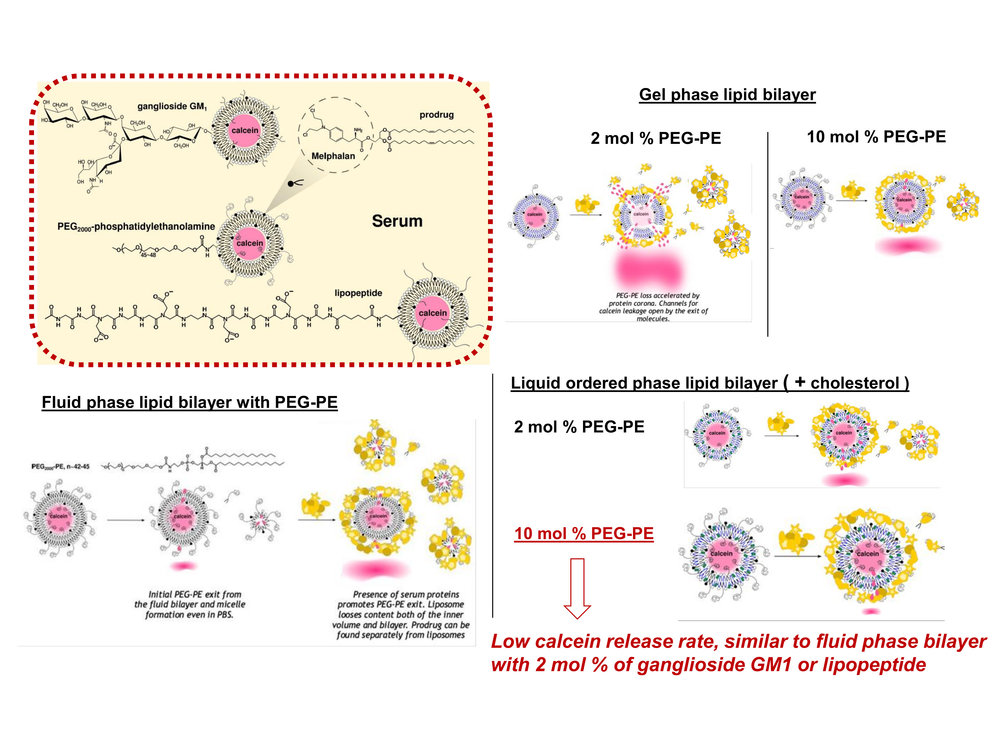
Исследовано влияние ряда амфифильных молекул в липидном бислое на целостность 100-нм-липосом, нагруженных липофильным пролекарством химиотерапевтического препарата мелфалана, в сыворотке крови человека. С помощью флуоресцентных методов показано, что фосфатидилинозит защищает от деградации жидкофазный липидный бислой, сформированный на основе яичного фосфатидилхолина, не менее 4 ч, а ганглиозид GM1 и конъюгат карбоксилированного олигоглицина с фосфатидилэтаноламином – вплоть до 24 ч. В то же время, конъюгат полиэтиленгликоля-2000 с фосфатидилэтаноламином (ПЭГ-липид) способствовал разрушению липосом: происходило вымывание липидов из жидкофазного липидного бислоя, а в случае твердофазной мембраны (гелевая фаза бислоя), содержащей менее 10 мол. % ПЭГ-липида, в ней возникали разрывы (мембрана давала течь). ПЭГ-липид хорошо стабилизировал липидный бислой, находящийся в конденсированной жидкоупорядоченной фазе, то есть содержащий достаточное количество холестерина. Описанные эффекты следует учитывать при использовании липофильных конъюгатов ПЭГ в составе супрамолекулярных систем доставки лекарств, нестабилизированных ковалентными связями, таких как липосомы, липидные наносферы, мицеллы.
- 2018 Influence of stabilizing components on the integrity of antitumor liposomes loaded with lipophilic prodrug in the bilayer. Colloids Surf B Biointerfaces 166 45–53
Отдел биомолекулярной химии
Лаборатория химии метаболических путей (Ямпольский И.В.)
Oткрытие механизма биолюминесценции грибов, а также создание люминесцентных дрожжей
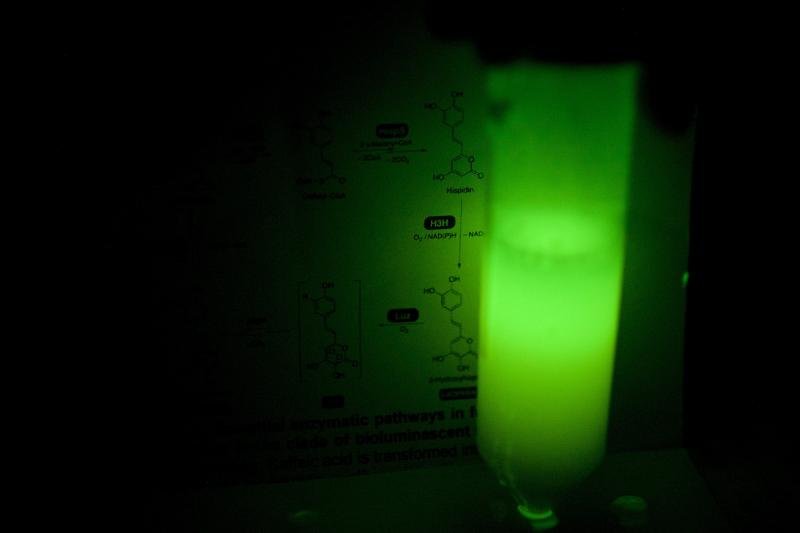
Ученые Института биоорганической химии РАН и ФИЦ Красноярский научный центр СО РАН вместе с российскими и иностранными коллегами полностью описали механизм, позволяющий грибам светиться в темноте. Испускание света обеспечивают всего четыре фермента, перенос которых в любые другие организмы делает их светящимися. Чтобы это проиллюстрировать, авторы создали светящиеся в темноте дрожжи.Теоретическая и экспериментальная части работы поддержаны грантами Российского научного фонда. Результаты исследования опубликованы в журнале Proceedings of the National Academy of Sciences
Расшифровка механизма свечения грибов стала возможной благодаря многолетним предшествующим исследованиям. Еще в начале XIX века было установлено, что источник свечения гниющего дерева – грибница. В 2009 году Андерсон Оливейра и Кассиус Стевани, соавторы настоящей работы, определилили, что все светящиеся грибы испускают свет благодаря единому механизму, а в 2015-2017 годах российские ученые под руководством Ильи Ямпольского совершили ряд ключевых открытий, в том числе определили структуру люциферина – молекулы, окисление которой приводит к испусканию света.
- 2018 Genetically encodable bioluminescent system from fungi. Proc Natl Acad Sci U S A 115 (50) 12728–12732
Отдел биоматериалов и бионанотехнологий
Лаборатория молекулярной биофизики (Олейников В.А.)
,Лаборатория моделирования биомолекулярных систем (Ефремов Р.Г.)
,Лаборатория углеводов (Бовин Н.В.)
Супрамеры на основе амфифильных молекул липид-олигопептид-биотин
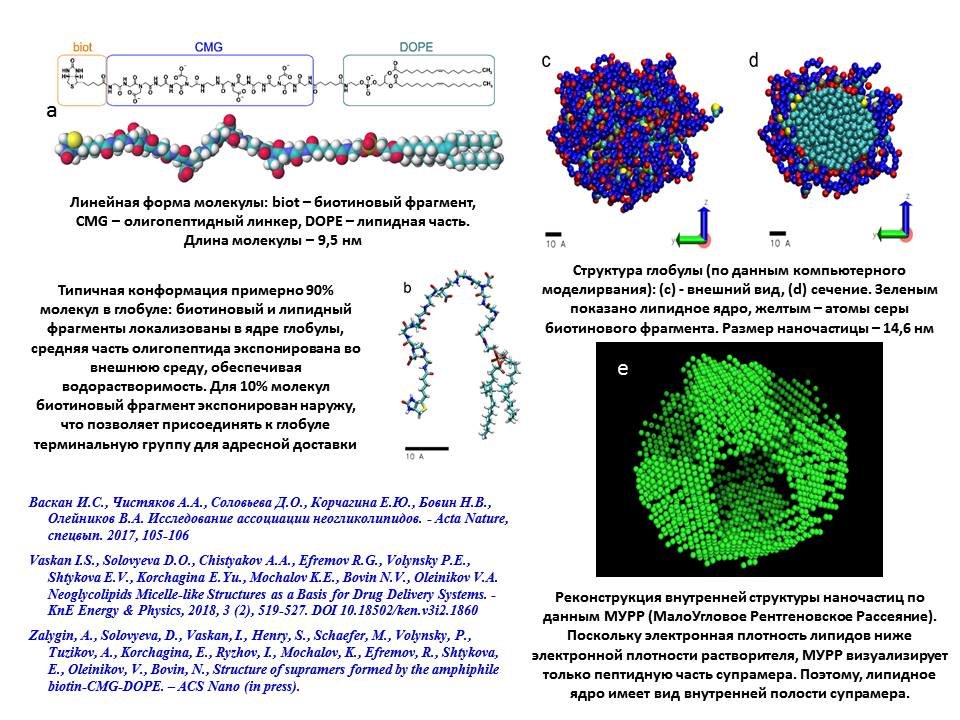
Обнаружено, что соединения на основе олигопептидов с концевыми липидным и биотиновым фрагментами, в водной среде способны образовывать мицеллоподобные однородные по размерам и внутренней структуре супрамеры (глобулы). Методами оптической спектроскопии, атомно-силовой и электронной микроскопии, а также малоуглового рентгеновского рассеяния и компьютерного моделирования показано, что глобулы весьма однородны по размерам (около 14, 6 нм). Показано, что ядро глобул содержит липидные и, частично, биотиновые фрагменты, а определенным образом свернутые олигопептиды, образуют оболочку. Часть (до 10%) биотиновых фрагментов экспонирована наружу, и может быть использована для селективного присоединения заданных молекул. Мицеллоподобные супрамеры, содержащие естественные для живого организма соединения, могут стать основой новых типов транспортеров для адресной доставки лекарств.
Лаборатория молекулярной биофизики (Олейников В.А.)
Высокоэффективные био-фотоэлектроды для количественной оценки и измерения фототока, создаваемого единичной молекулой фотореакционного центра
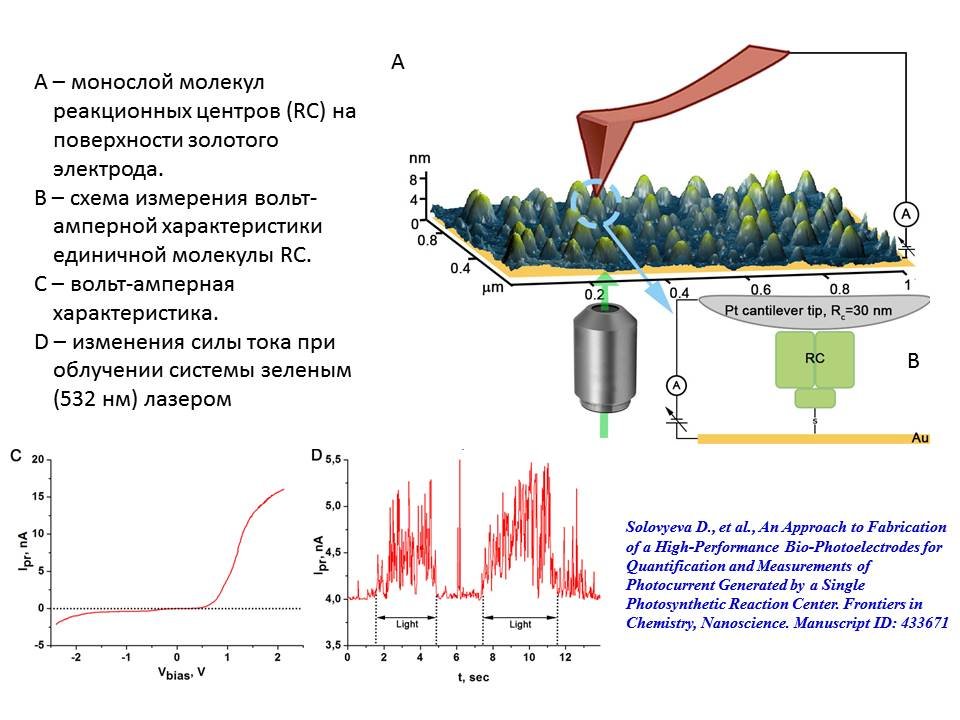
Предложен новый подход к изготовлению высокоэффективных биофотоэлектродов состоящих из белков фотосинтетического реакционного центра (RC), иммобилизованных на проводящей поверхности. Основой разработки стали новые данные, полученные в результате вольтамперометрических измерений на проводящей границе между единичным фотосинтетическим RC и золотым электродом. Это позволило использовать не только количественную оценку эффективности метода иммобилизации RC, но и измерения тока единичного RC. Показано, что использование ковалентной связи S-Au для иммобилизации RC на поверхности электрода позволяет существенно (на порядок) повысить эффективность системы, что перспективно в плане создания биогибридных фоточувствительных устройств.
Лаборатория полимеров для биологии (Зубов В.П.)
Новый способ одностадийного выделения ДНК из образцов почвы для ПЦР-диагностики фитопатогенов.
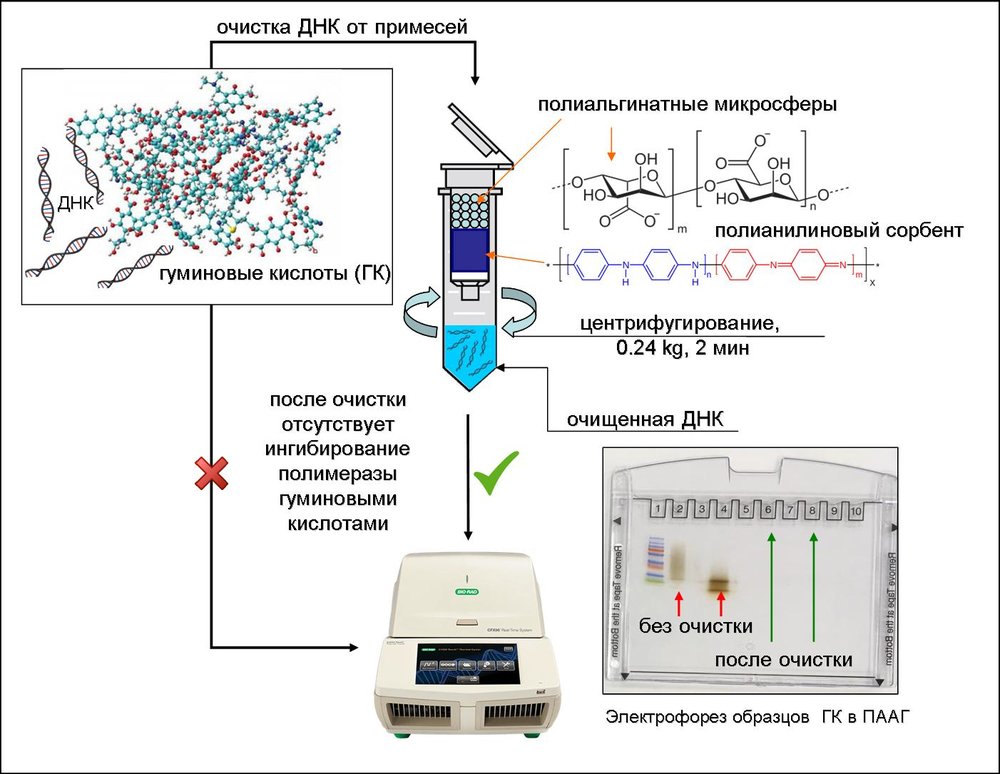
Разработан новый биосепарирующий элемент (БЭ), содержащий полианилин-модифицированный кремнезем и полиальгинатные микросферы, обеспечивающий одностадийное выделение ДНК из почвенных экстрактов с одновременной очисткой ДНК от фракций гуминовых кислот, для ПЦР диагностики фитопатогенов. Все сорбционно-активные компоненты БЭ изготавливаются в лаборатории по оригинальным методикам.
Соответствующая публикация подготовлена и запланирована на I квартал 2019 г. в Colloids and Surfaces B: Biointerfaces (IF 3.997, Q1).
Авторы: Простякова А.И., Зыбин Д.И., Капустин Д.В.
Лаборатория иммунохимии (Бровко Ф.А.)
Исследование изолятов Staphylococcus aureus, полученных из молока КРС с субклинической формой мастита.
Исследована связь субклинической формы мастита коров со свойствами токсикогенных стафилококков. Впервые показано, что патогенные штаммы стафилококка золотистого содержат набор экзотоксинов. Представленность токсинов у животных составляла: альфа-токсин (hlA) - 70%; лейкосидин (lucS) - 46.6%; альфа пептид (psmA) - 81.6%; бета пептид (psmB) - 95%; дельта токсин (hld) - 78.3% штаммов. Пептидный токсин psmB обнаруживался почти у всех штаммов, также, часто встречается hld и psmA. 88% штаммов выделенных от больных животных содержали гены энтеротоксинов sea - 53.3%, seb - 3.3%, sec - 50%, sed - 4%, see - 46.6%, seg - 70%, sei - 10%, selp - 3.3% и tsst1 -1.6%. Уровень продукции токсинов был низкий и не превышал 18 нг/мл. Обнаружены штаммы, продуцирующие одновременно по два и по три энтеротоксина, что повышает их патогенность.
Проведено полногеномное секвенирование и анонсирование геномов пяти штаммов стафилококка золотистого. Анализ геномов подтвердил наличие и локализацию генов токсинов.
- 2018 Exotoxin diversity of Staphylococcus aureus isolated from milk of cows with subclinical mastitis in Central Russia. J Dairy Sci 101 (5) 4325–4331
- 2018 Immunochemical assay with monoclonal antibodies for detection of staphylococcal enterotoxin H. J Food Drug Anal 26 (2) 741–750
- 2018 Draft genome sequences of five Staphylococcus aureus strains isolated from clinically healthy cows in the Russian Federation. Genome Announc 6 (16)
- 2017 Detection of staphylococcal enterotoxin a by phage display mediated immuno-PCR method. Russ. J. Bioorganic Chem. 43 (5) 540–543
- 2017 Детекция стафилоккокового энтеротоксина А методом фаговой иммуно-ПЦР. 43 518–522
- 2016 Staphylococcal enterotoxin a detection with phage displayed antibodies. Russ. J. Bioorganic Chem. 42 (3) 294–299
Лаборатория иммунохимии (Бровко Ф.А.)
Исследование роли белка YB-1 в реакциях врождённого иммунитета.
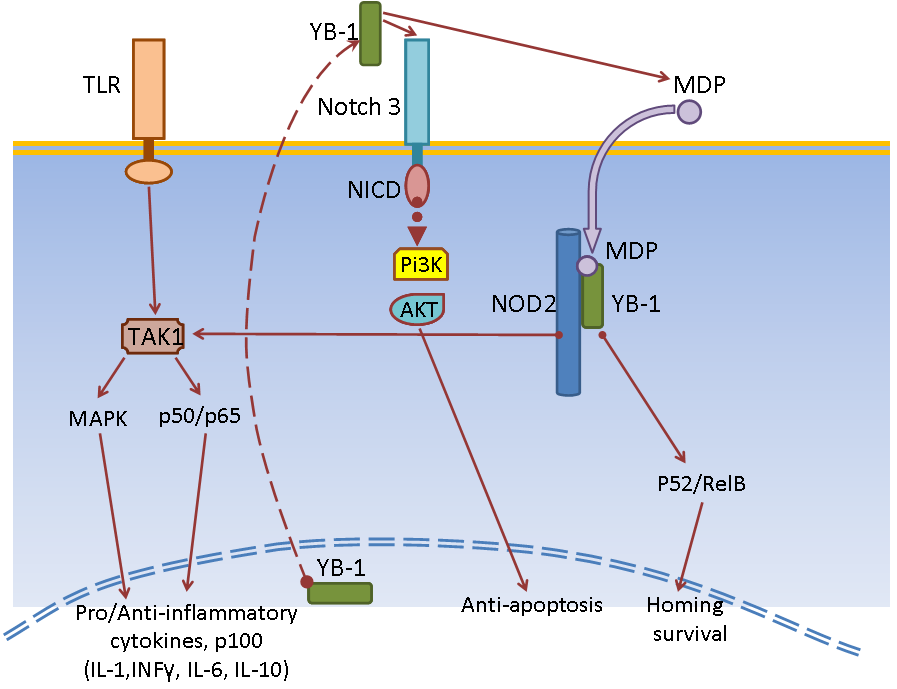
В рамках выполнения темы № 59.8. « Исследование роли белка YB-1 в реакциях врождённого иммунитета.» были получены следующие результаты:
Мы подтвердили, что производное бактериальной клеточной стенки GMDP потенцирует ответ В-клеток на антиген Y. pestis V; мы также сообщаем, что основная связывающая мишень для GMDP, белка-хозяина YB-1 сама обладает адъювантными свойствами in vivo и что комбинация YB-1 и GMDP синергически увеличивает количество B-клеток и сродство к V-антигену.
YB-1 смог повысить выживаемость у мышей, получавших инъекцию смертельной дозы E. coli в модели острого бактериального сепсиса и введение рекомбинантного белка для мышей за 12 ч до летального заражения с E. coli, что привело к 50% долгосрочной выживаемости. Данные, полученные нами в модели in vitro и in vivo, позволяют предложить схему биохимических путей реализации сигналинга ГМДП в клетках животных и ключевую роль белка YB-1.
- 2016 Muramyl peptides activate innate immunity conjointly via YB1 and NOD2. Innate Immun 22 (8) 666–673
Группа молекулярной экологии (Трубецкая О.Е.)
Идентификация флуорофоров в наночастицах растворенного органического вещества из реки Сувани (США)
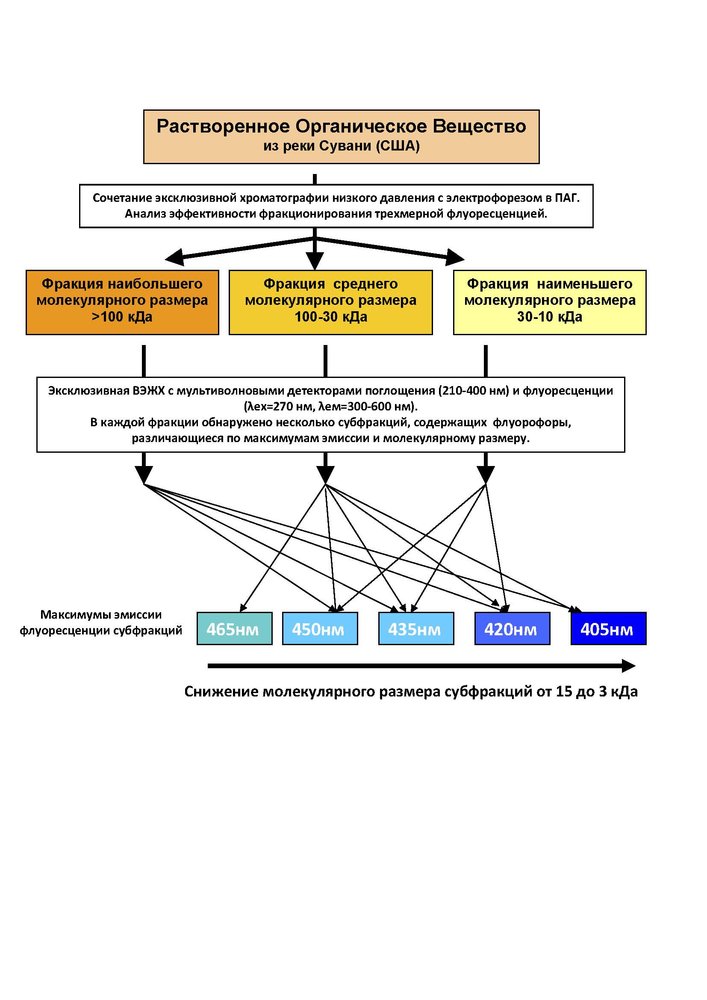
- 2018 Molecular Size Distribution of Fluorophores in Aquatic Natural Organic Matter: Application of HPSEC with Multi-Wavelength Absorption and Fluorescence Detection Following LPSEC-PAGE Fractionation. Environ Sci Technol 52 (9) 5287–5295
- 2018 Excitation-Dependent Fluorescence Quantum Yield for Freshwater Chromophoric Dissolved Organic Matter from Northern Russian Lakes. J Spectrosc (Hindawi) 2018
Отдел геномики адаптивного иммунитета
Лаборатория методов иммуносеквенирования (Чудаков Д.М.)
Необычное устройство Т-клеточного иммунитета долгоживущих грызунов
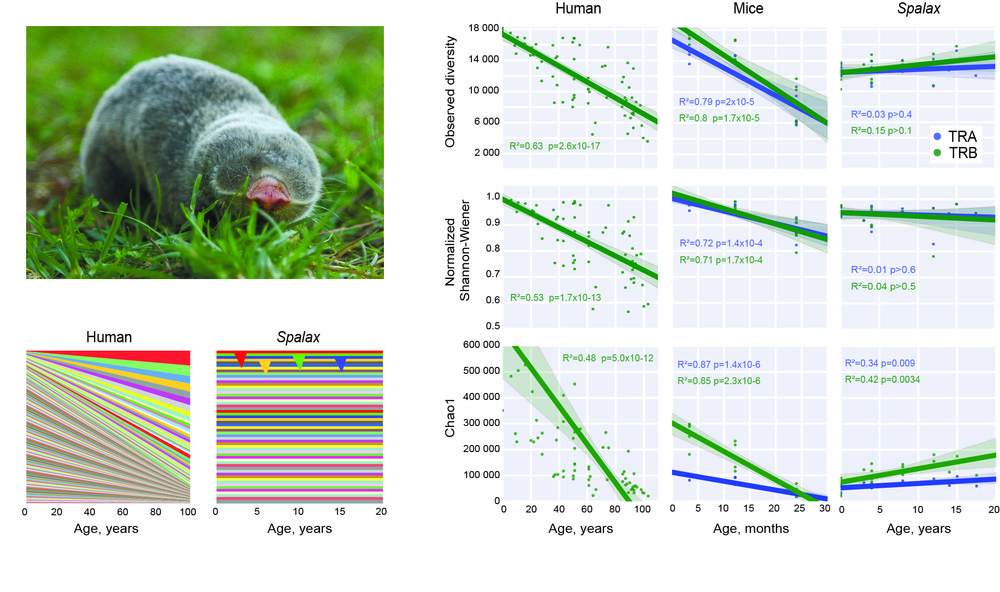
Показано, что Т-клеточный иммунитет долгоживущего грызуна Spalax (слепушонок) с возрастом не накапливает крупных клональных экспансий, в отличие от человека и мыши.
Также проведен ряд исследований Т- и В-клеточного адаптивного иммунитета человека и модельных животных, в том числе по направлениям:
- возрастные изменения в В-клеточном ответе на вакцинацию
- Т клеточный ответ на вакцинацию на близнецах
- экстракция репертуаров Т-клеточных рецепторов из данных RNA-Seq
- функциональные сабсеты регуляторных Т-лимфоцитов
- память и специфичность адаптивного ответа гамма-дельта Т лимфоцитов
- 2018 Precise tracking of vaccine-responding T cell clones reveals convergent and personalized response in identical twins. Proc Natl Acad Sci U S A 115 (50) 12704–12709
- 2018 Reply to: Evaluation of immune repertoire inference methods from RNA-seq data. Nat Biotechnol 36 (11) 1035–1036
- 2018 CD49b defines functionally mature Treg cells that survey skin and vascular tissues. J Exp Med 215 (11) 2796–2814
- 2018 Comparative Analysis of B-Cell Receptor Repertoires Induced by Live Yellow Fever Vaccine in Young and Middle-Age Donors. Front Immunol 9 2309
- 2018 Human liver infiltrating γδ T cells are composed of clonally expanded circulating and tissue-resident populations. J Hepatol 69 (3) 654–665
- 2018 The changing landscape of naive T cell receptor repertoire with human aging. Front Immunol 9 1618
- 2018 Optimized peptide-MHC multimer protocols for detection and isolation of autoimmune T-cells. Front Immunol 9 1378
- 2018 CD8+T cells with characteristic T cell receptor beta motif are detected in blood and expanded in synovial fluid of ankylosing spondylitis patients. Rheumatology (Oxford) 57 (6) 1097–1104
- 2018 The human Vδ2+T-cell compartment comprises distinct innate-like Vγ9+and adaptive Vγ9-subsets. Nat Commun 9 (1) 1760
- 2018 Quantitative profiling reveals minor changes of T cell receptor repertoire in response to subunit inactivated influenza vaccine. Vaccine 36 (12) 1599–1605
- 2018 Method for identification of condition-associated public antigen receptor sequences. Elife 7
Лаборатория сравнительной и функциональной геномики (Лебедев Ю.Б.)
Клональный профайлинг Т-клеточного ответа на противовирусную вакцинацию
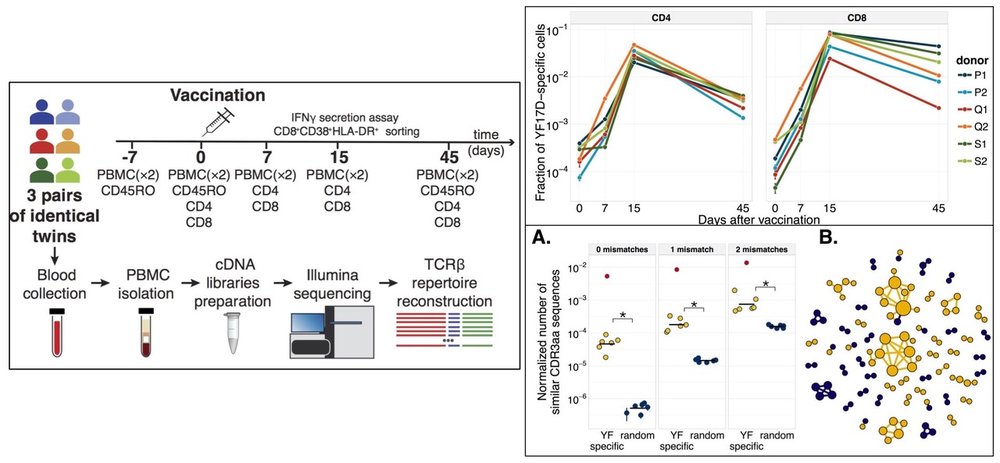
Разработан экспериментальный подход, включающий оригинальную систему биоинформатической обработки, для выявления случаев клональной экспансии в динамическом репертуаре периферических Т-лимфоцитов человека. Мы применили этот подход к анализу репертуаров Т-клеточных рецепторов (TCR) у трех пар монозиготных близнецов, иммунизированных вакциной против вируса желтой лихорадки (YF). У каждого из обследованных доноров мы идентифицировали от 600 до 1700 отвечающих на вакцину Т-клонов. При сравнительном анализе структуры TCR YF-ассоциированных репертуаров было обнаружено повышенное число совпадающих клонов у близнецов. Для предсказания структуры TCR антиген-специфичных клонов у неродственных индивидов создан и успешно апробирован новый метод биоинформатической обработки данных секвенирования. Созданный подход также может быть использован при анализе постинфекционного состояния адаптивного иммунитета для идентификации новых патоген-специфических клонов Т-клеток.
- 2018 Precise tracking of vaccine-responding T cell clones reveals convergent and personalized response in identical twins. Proc Natl Acad Sci U S A 115 (50) 12704–12709
Отдел метаболизма и редокс-биологии
Лаборатория молекулярных технологий (Белоусов В.В.)
Хемогенетическая модель сердечной недостаточности

Окислительный стресс является, по сути, дисбалансом потоков электронов внутри клетки: утечка электронов из каскадов метаболических и электрохимических реакций на кислород ведут к образованию активных форм кислорода и окислительному повреждению молекулярных структур в клетке. В норме такие утечки компенсируются работой эффективных антиоксидантных ферментов и систем репарации и биосинтеза. Однако если утечек слишком много, или если антиоксидантные системы испытывают недостаток «топлива», окислительное повреждение может накапливаться и приводить к некорректной работе клетки или органа. Это состояние и называется окислительным стрессом.
Существует множество научных данных разной степени достоверности о том, что окислительный стресс лежит в основе множества патологий, в первую очередь заболеваний сердечно-сосудистой системы, где кислород является «центральной» молекулой. Однако практически любая патология имеет сложную структуру, в которую вовлечено огромное количество различных метаболических и сигнальных процессов. Зачастую невозможно понять, является тот или иной процесс причиной или следствием патологии. Окислительный стресс является здесь типичным примером. Является ли он причиной или хотя бы неотъемлемым компонентом сердечной патологии, или вторичным процессом, возникающим на поздних стадиях заболевания в ходе рассогласования каких-то других процессов? Ответить на этот вопрос было невозможно без создания новых модельных организмов, в которых ученые могли бы «включать» окислительный стресс в здоровом сердце и потом наблюдать, развивается ли патология и насколько она похожа на болезнь, развивающуюся «естественным» путем.
Исследователи из ИБХ РАН вместе с коллегами из Гарварда создали такую модель, используя принципы синтетической биологии: перенося молекулярные блоки из одних организмов в другие с целью создания живых систем с новыми свойствами. Одним из направлений синтетической биологии является хемогенетика: внедрение в клетку генов, кодирующих белки, функционирующие в присутствии определенных химических веществ. Чтобы исследовать окислительный стресс на сердце, исследователи использовали оксидазу D-аминокислот (DAAO) — фермент, который был клонирован из дрожжей. Известно, что DAAO продуцирует пероксид водорода (H2O2) только в присутствии D-аминокислот, что приводит к окислительному стрессу. Но так как клетки млекопитающих используют почти исключительно L-аминокислоты, а не их D-стереоизомеры, фермент DAAO остается неактивным в клетках сердца до того момента как исследователи вводят в организм животного аминокислоту D-аланин. Команда исследователей использовала вирус для доставки DAAO в сердца крыс, а затем животных поили в течение нескольких недель питьевой водой, содержащей D-аланин. Затем сердца животных исследовали, используя эхокардиографию для измерения сердечной функции и размера сердца. Кроме того, исследователи измеряли маркеры воспалительного и адаптивного стресса.
Оказалось, что окислительный стресс вызывает у животных дилатационную кадиомиопатию — заболевание, при котором происходит растяжение полостей сердца. У животных значительно повышался уровень маркеров кардиомиопатии, таких как предсердный натрийуретический пептид и кардио-тропонин I. При этом не наблюдалось фиброза сердечной ткани, что свидетельствует о том, что либо фиброз не ассоциирован с окислительным стрессом, либо он возникает на более поздних стадиях патологии.
- 2018 Chemogenetic generation of hydrogen peroxide in the heart induces severe cardiac dysfunction. Nat Commun 9 (1) 4044
Лаборатория молекулярных технологий (Белоусов В.В.)
Флуоресцентный pH-сенсор для рекордно точного наблюдения за процессами в клетке
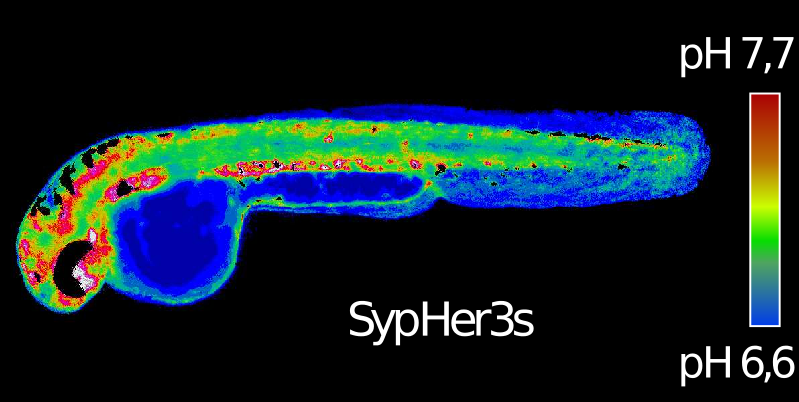
Этот «молекулярный pH-метр» является усовершенствованной версией рН-сенсоров семейства SypHer, разработанных ранее в лаборатории. Сенсор позволяет количественно измерять рН в живых системах разной степени сложности. SypHer3s методами генетической инженерии может быть доставлен живую клетку и, благодаря своей беспрецедентно высокой яркости, может использоваться в микроскопии высокого разрешения: например, для точных наблюдений за колебаниями кислотности в клетках или даже в целых организмах — в статье впервые измерен рН в различных тканях эмбриона рыбки данио-рерио.
Кроме того, с помощью SypHer3s удалось продемонстрировать функциональную неоднородность митохондрий в разных компартментах нейронов. В теле нейрона митохондрии малоактивны, в то время как в синапсах они начинают активно откачивать протоны из матрикса, создавая электрохимический градиент, необходимый для синтеза АТФ. Следить за этими процессами удобно с помощью рН сенсора, направленного в митохондрии. По словам Всеволода Белоусова, «складывается впечатление, что разные части нейрона получают энергию по-разному: тело живет за счет гликолиза, а синапсы — за счет окислительного фосфорилирования».
- 2018 SypHer3s: A genetically encoded fluorescent ratiometric probe with enhanced brightness and an improved dynamic range. Chem Commun (Camb) 54 (23) 2898–2901
Отдел функционирования живых систем
Лаборатория молекулярного дизайна и синтеза (Коршун В.А.)
,Лаборатория биомолекулярной ЯМР-спектроскопии (Арсеньев А.С.)
,Группа структурной биологии ионных каналов (Шенкарёв З.О.)
,Лаборатория нейрорецепторов и нейрорегуляторов (Козлов С.А.)
Структура и свойства новых антибиотиков
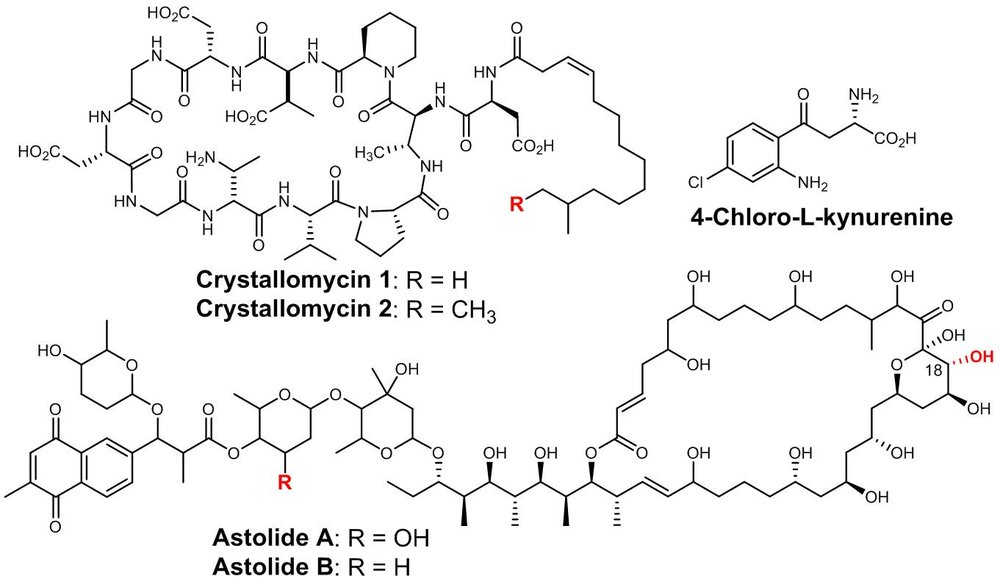
Авторы: Апарин И.О., Проскурин Г.В., Прохоренко И.А., Коршун В.А. (Лаборатория молекулярного дизайна и синтеза), Шенкарев З.О. (Группа структурной биологии ионных каналов), Парамонов А.С. (Лаборатория биомолекулярной ЯМР-спектроскопии), Рогожин Е.А. (Лаборатория нейрорецепторов и нейрорегуляторов).
Установлена структура двух компонентов липопептидного антибиотика кристалломицина из образца, полученного 60 лет назад. Установлена идентичность компонентов кристалломицина двум компонентам аспартоцина, структура которых была выяснена недавно. Антибиотик проявляет Ca2+-зависимую активность к грам-положительным бактериям. С помощью ЯМР исследованы конформации кристалломицина 2 в растворе.
В составе пептидного антибиотика INA-5812 обнаружена аминокислота 4-хлор-L-кинуренин, ранее встречавшаяся в природных продуктах лишь однажды. Нами впервые описаны флуоресцентные свойства 4-хлор-L-кинуренина и его использование в качестве донора энергии для возбуждения других флуорофоров.
С использованием различных методов 2D ЯМР установлена структура двух новых макролидных антибиотиков, астолидов А и Б. Молекулы астолидов одновременно содержат в качестве агликонов мембрано-активный полиольный макролид и редокс-активный нафтохиноновый остаток. Наличие гидроксильной группы в положении 18 принципиальным образом меняет спектр биологической активности по сравнению с известными аналогами – возрастает противогрибковая активность и снижается цитотоксичность.
- 2018 4-Chloro-l-kynurenine as fluorescent amino acid in natural peptides. Amino Acids
- 2018 Astolides A and B, antifungal and cytotoxic naphthoquinone-derived polyol macrolactones from Streptomyces hygroscopicus. Tetrahedron
- 2018 Diversity, novelty, and antimicrobial activity of endophytic actinobacteria from mangrove plants in Beilun Estuary National Nature Reserve of Guangxi, China. Front Microbiol 9 868
- 2018 Crystallomycin revisited after 60 years: Aspartocins B and C. Medchemcomm 9 (4) 667–675
Группа молекулярных инструментов для исследования живых систем (Аралов А.В.)
,Лаборатория молекулярного дизайна и синтеза (Коршун В.А.)
Новые противовирусные нуклеозидные производные для ингибирования репродукции вируса клещевого энцефалита и вируса варицелла-зостер
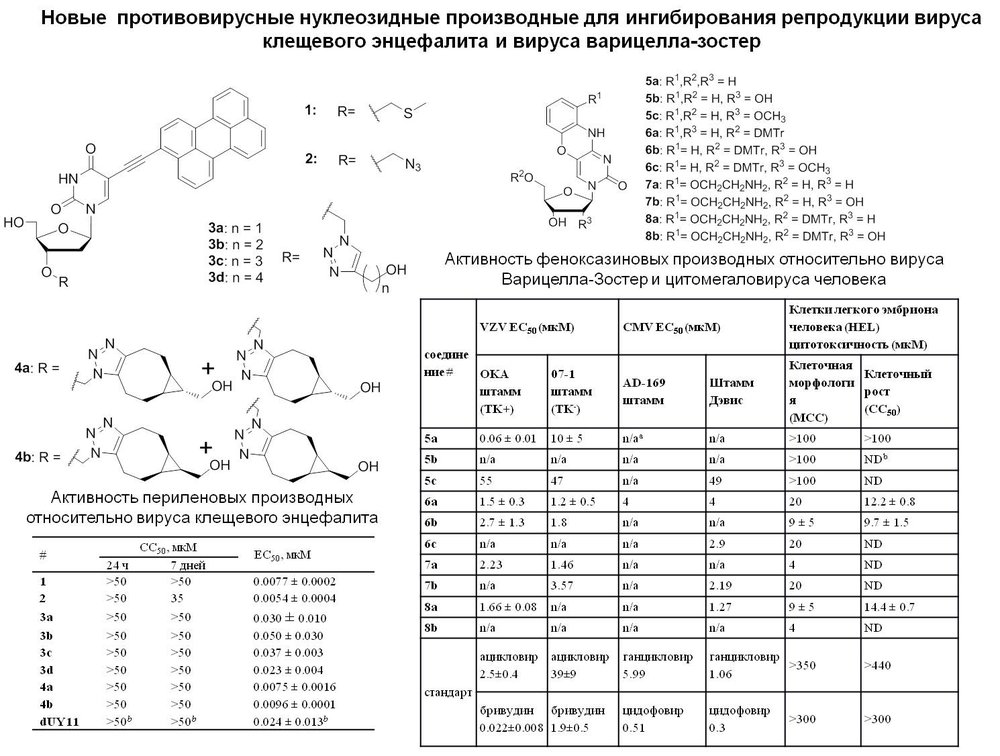
Был получен ряд аналогов эффективного противовирусного периленового нуклеозида, dUY11, с метилтиометильной (МТМ), азидометильной (AZM) и HO-С1-4-алкил-1,2,3-триазол-1,4-диильными группами в 3`-O-положении, а также два продукта реакции безмедного алкин-азидного циклоприсоединения AZM производного, и исследована их активность относительно вируса клещевого энцефалита (ВКЭ). Четыре соединения показали EC50 ≤10 нМ, таким образом, являясь наиболее эффективными ингибиторами ВКЭ на сегодняшний день. Кроме того, эти нуклеозиды обладают большей липофильностью (clogP) и повышенной растворимостью в водном ДМСО по сравнению с исходным dUY11.
Феноксазиновый остов широко используется для стабилизации дуплексов нуклеиновых кислот, как часть флуоресцентных зондов для исследования структуры, узнавания и метаболизма нуклеиновых кислот и т.д. Мы осуществили синтез феноксазиновых нуклеозидных производных и исследовали их противовирусную активность относительно панели структурно разнообразных вирусов: оболочечных ДНК герпесвирусов: вируса варицелла-зостер (ВЗВ) и цитомегаловируса человека; оболочечного РНК вируса клещевого энцефалита (ВКЭ), а также необолочечных РНК энтеровирусов. Изучаемые соединения эффективно подавляли репродукцию ДНК и РНК вирусов в культуре клеток. 3-(2’-Дезокси-β-D-рибофуранозил)-1,3-диаза-2-оксофеноксазин оказался мощным ингибитором репликации ВЗВ с большей активностью по отношению к штамму дикого типа, по сравнению со штаммом с дефицитом тимидинкиназы (EC50 0,06 и 10 мкМ, соответственно). Данное соединение не проявляло цитотоксичности на всех изучаемых клеточных линиях. Несколько перспективных соединений показали активность относительно ВКЭ (EC50 0.35-0.91 мкМ), но активность сопровождалась выраженной цитотоксичностью. Данные соединения можно рассматривать в качестве отправной точки для дальнейшей оптимизации структуры антигерпесвирусных или антифлавивирусных соединений.
- 2018 3′-O-Substituted 5-(perylen-3-ylethynyl)-2′-deoxyuridines as tick-borne encephalitis virus reproduction inhibitors. Eur J Med Chem 155 77–83
Группа электронной микроскопии (Образцова Е.А.)
Сверхострые зонды для атомно-силовой микроскопии биомакромолекул
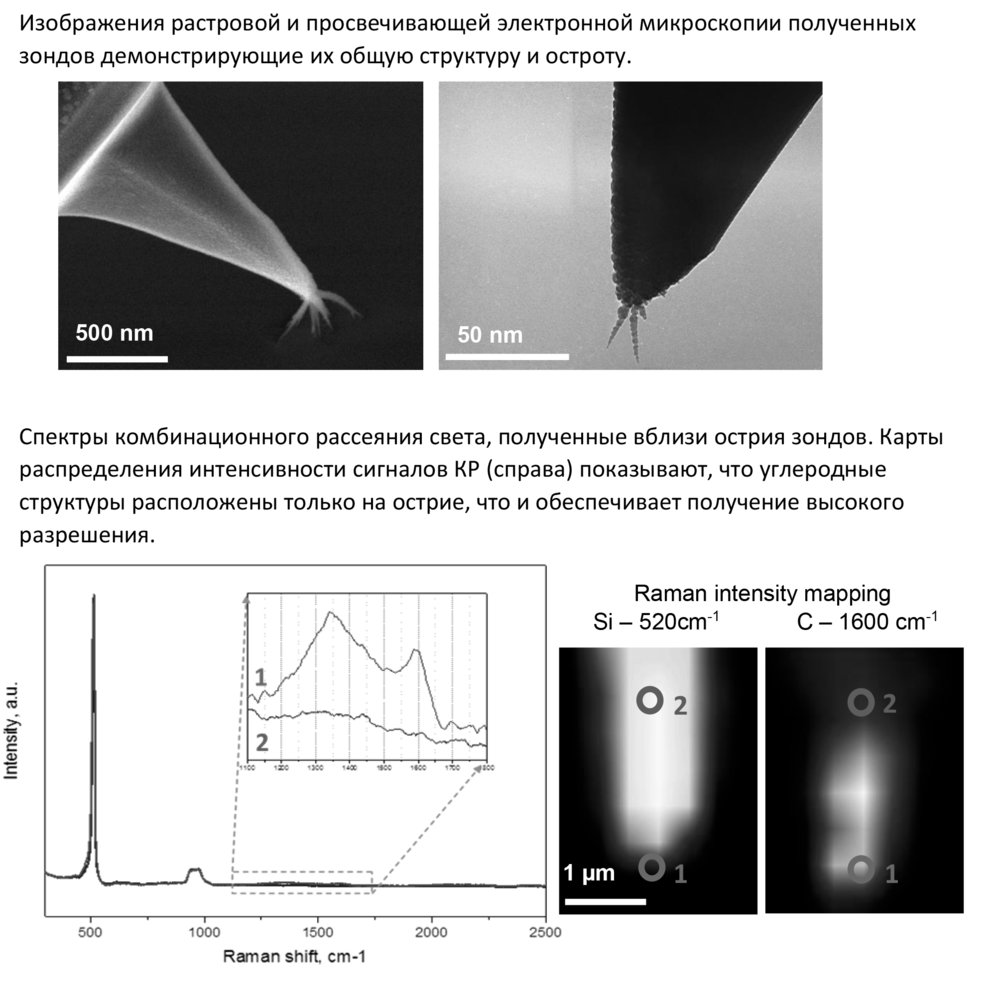
На протяжении нескольких лет в группе электронной микроскопии проводились разработки, направленные на боле эффективное применение метода атомно-силовой микроскопии для визуализации биомакромолекул. Ранее эмпирическим путем нами были подобраны условия для получения наноструктур на остриях стандартных зондов атомно-силового микроскопа, позволяющие улучшить разрешение метода примерно на порядок (с 15-20 нм до ~2 нм). В 2018 году нами было закончено исследование физических свойств этих структур, объясняющие механизмы роста и эффективность в микроскопии. По результатам работы в 2018 году была публикована статья в журнале Ultramicroscopy, входящем в 1 квартиль. В 2017 году было представлено 2 доклада на конференциях по.
Синтез происходит с помощью метода газофазного химического осаждения, активированного плазмой. Статистический анализ изображений электронной микроскопии показывает, что скорость роста разветвленных наноструктурированных остий составляет порядка 100 нм/час. Радиус закругления полученных структур составляет 1-2 нм. Результаты исследования полученных зондов методом комбинационного рассеяния света показали, что разветвленные структуры состоят из аморфного углерода и, п-видимому типа glassy carbon, поскольку имеют высокие механические характеристики.
- 2018 Carbon Nanospikes: Synthesis, characterization and application for high resolution AFM. Ultramicroscopy 197 11–15
Отдел «Учебно-научный центр» (Овчинникова Т.В.)
,Группа структурной биологии ионных каналов (Шенкарёв З.О.)
Новые антимикробные пептиды из древних морских беспозвоночных
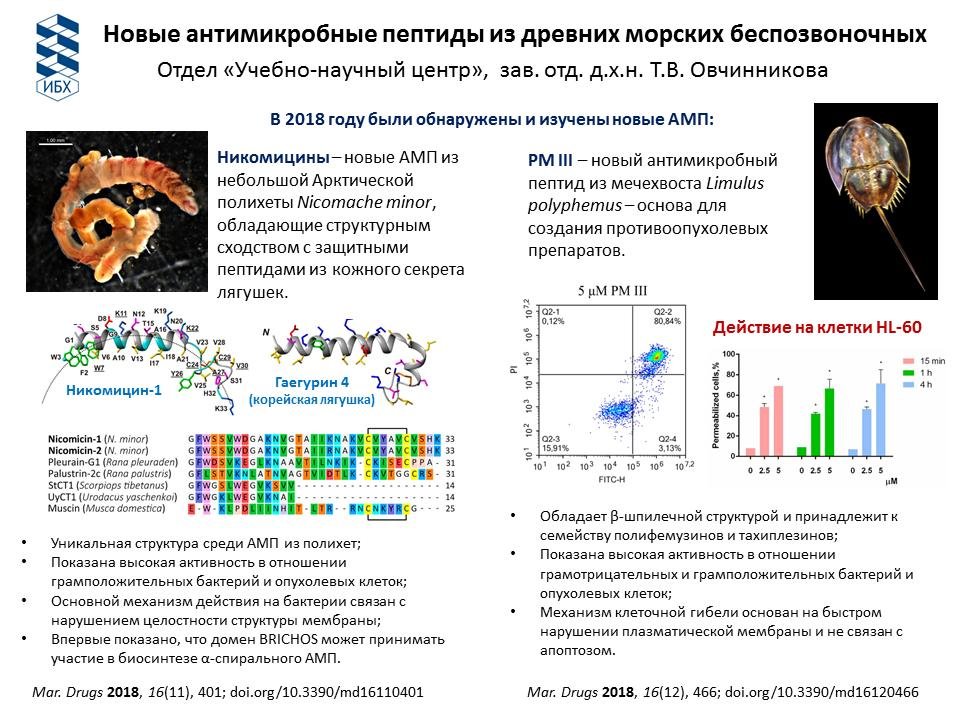
В рамках работы по изучению антимикробных пептидов (АМП) животных, проводимой в Учебно-научном центре ИБХ РАН, были обнаружены новые защитные катионные пептиды из древних морских беспозвоночных – никомицины-1 и -2 из небольшой Арктической полихеты Nicomache minor и полифемузин III (PM III) из мечехвоста Limulus polyphemus, а также изучены их структурные и биологические свойства. В ходе работы были получены рекомбинантные аналоги природных АМП и изучена их пространственная структура. Никомицины обладают пространственной структурой, включающей амфипатическую N-концевую α-спираль и C-концевую петлю, состоящую из шести аминокислотных остатков и стабилизированную дисульфидной связью. Структура никомицина уникальна среди AMП полихет и сходна со структурой α-спиральных защитных AMП из кожи лягушек, содержащих С-концевой мотив Rana-box, также стабилизированный дисульфидным мостиком. Никомицин-1 проявляет выраженную активность в отношении грамположительных бактерий в субмикромолярных концентрациях. Предполагается, что механизм действия никомицина-1 связан с повреждением клеточной мембраны, а не с ингибированием процесса биосинтеза белка. Структурный анализ последовательности препроникомицинов показывает, что домен BRICHOS может принимать участие в биосинтезе не только β-шпилечных АМП полихет, но и α-спиральных пептидов, а именно, никомицинов. PM III представляет собой β-шпилечный АМП, который способен быстро повышать проницаемость цитоплазматической мембраны клеток лейкемии человека HL-60. Эксперименты с использованием проточной цитометрии с двойным окрашиванием аннексином V-FITC / пропидий йодидом показали, что ингибитор каспазы Z-VAD-FMK практически не влияет на действие пептида PM III. Полученные данные свидетельствуют о том, что PM III нарушает целостность плазматической мембраны и вызывает гибель клеток по механизму, предположительно, не связанному с апоптозом. По сравнению со своими природными изоформами – полифемузинами и тахиплезинами, PM III проявляет аналогичную или более низкую антибактериальную активность, но значительно более высокую цитотоксичность в отношении опухолевых и трансформированных клеточных линий человека в условиях in vitro.
- 2018 Cytotoxic Potential of the Novel Horseshoe Crab Peptide Polyphemusin III. Mar Drugs 16 (12)
- 2018 Novel Antimicrobial Peptides from the Arctic Polychaeta Provide New Molecular Insight into Biological Role of the BRICHOS Domain. Mar Drugs 16 (11)
Группа генно-инженерных биофармацевтических технологий (Есипов Р.С.)
Новый подход синтеза биологически важных нуклеотидов с использованием каскада термофильных ферментов
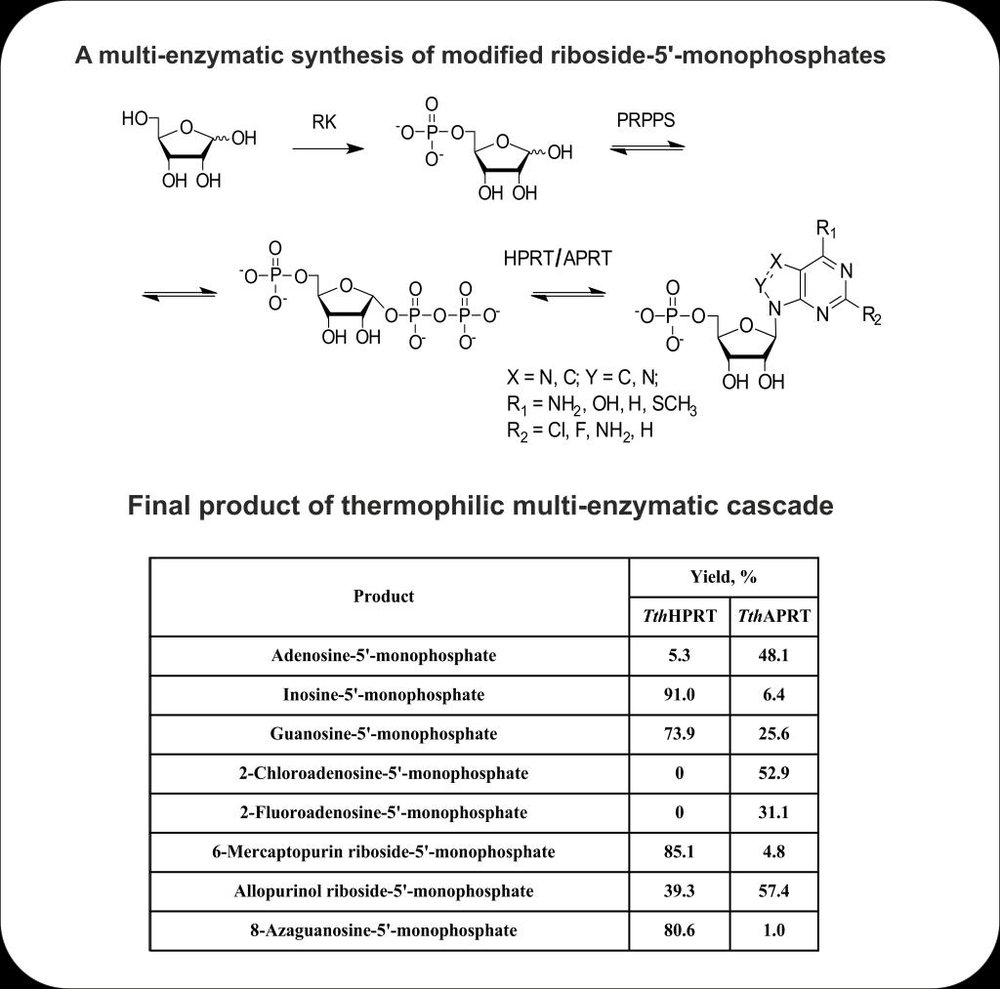
Реализована новая стратегия каскадного синтеза модифицированных нуклеотидов с участием ферментов из термофильных микроорганизмов (рибокиназы RK из Thermus species 2.9, фосфорибозилпирофосфатсинтетазы PRPPS и аденинфосфорибозилтрансферазы APRT /гипоксантинфосфорибозилтрансферазы HPRT из Thermus thermophilus HB27), осуществляющих последовательное превращение рибозы и гетероциклических пуриновых оснований в соответствующие нуклеотиды. Проведен комплекс работ по исследованию кинетических параметров реакций с участием рекомбинатных ферментов и оптимизации условий каскадного синтеза модифицированных нуклеотидов. С помощью разработанного каскада осуществлен синтез ряда 5′-монофосфатов нуклеозидов, являющихся потенциальными противовирусными и противораковыми препаратами. Проведена кристаллизация ферментов в апоформе и в комплексе с функциональными лигандами и последующие рентгеноструктурные исследования полученных кристаллов. Полученные структуры TthAPRT с разрешением 2.5 Å и комплекса TthPRPPS с АДФ с разрешением 2.2 Å депонированы в базу данных RCSB Protein Data Bank под идентификаторами 6fsp и 5t3o, соответственно. Получены рентгеноструктурные данные комплекса TspRK с АТФ при разрешении 1.9 Å для решения трехмерной структуры.
- 2018 Thermophilic phosphoribosyltransferases Thermus thermophilus HB27 in nucleotide synthesis. Beilstein J Org Chem 2018 (14) 3098–3105
- 2018 An explanation for the narrow carbohydrate substrate specificity of adenine phosphoribosyltransferase from Thermus thermophilus from the model of the enzyme, substrate and magnesium cation co-factor complex. J Biomol Struct Dyn 1–5
- 2018 Three-Dimensional Structure of Recombinant Adenine Phosphoribosyltransferase from Thermophilic Bacterial Strain Thermus thermophilus HB27. Russ. J. Bioorganic Chem. 44 (5) 504–510
Группа анализа и коррекции генома (Патрушев Л.И.)
Псевдоген PTENP1 метилирован в нормальных, гиперпластических и малигнизированных тканях эндометрия жещин среднего и пожилого возраста
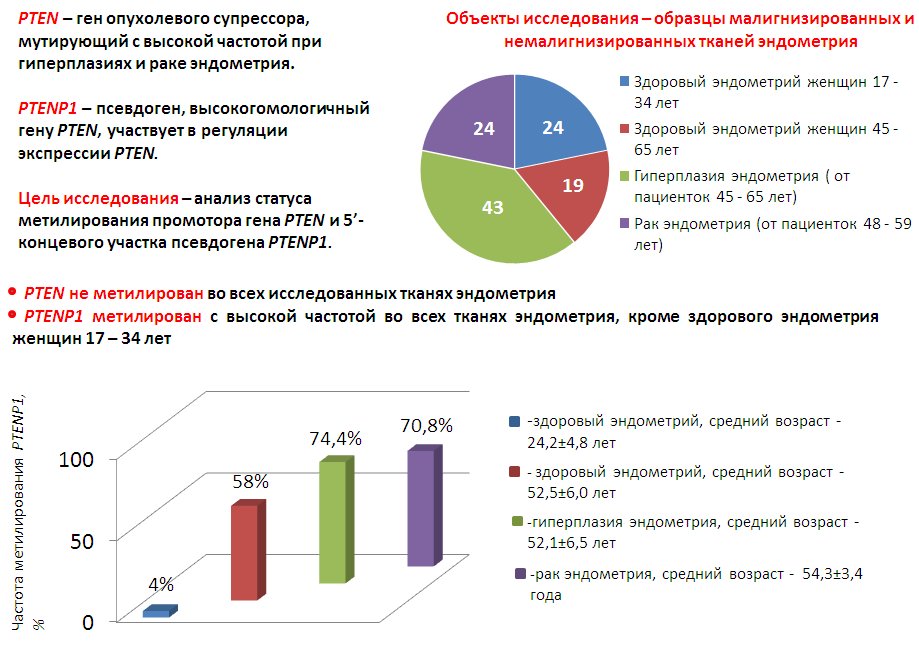
Показано, что двунаправленный промотор псевдогена PTENP1 метилирован с высокой частотой во всех исследованных тканях эндометрия, кроме нормального эндометрия молодых женщин (17 - 34 лет). Сделан вывод о том, что метилирование псевдогена PTENP1 отражает возрастные изменения в организме человека и может быть не связано непосредственно с развитием рака или гиперплазии эндометрия
- 2018 The PTENP1 pseudogene, unlike the PTEN gene, is methylated in normal endometrium, as well as in endometrial hyperplasias and carcinomas in middle- aged and elderly females. Acta Naturae 10 (1) 43–50
Лаборатория молекулярных основ эмбриогенеза (Зарайский А.Г.)
Малые ГТФазы Ras-dva, потерянные во время эволюции у амниот, регулируют регенерацию у анамний
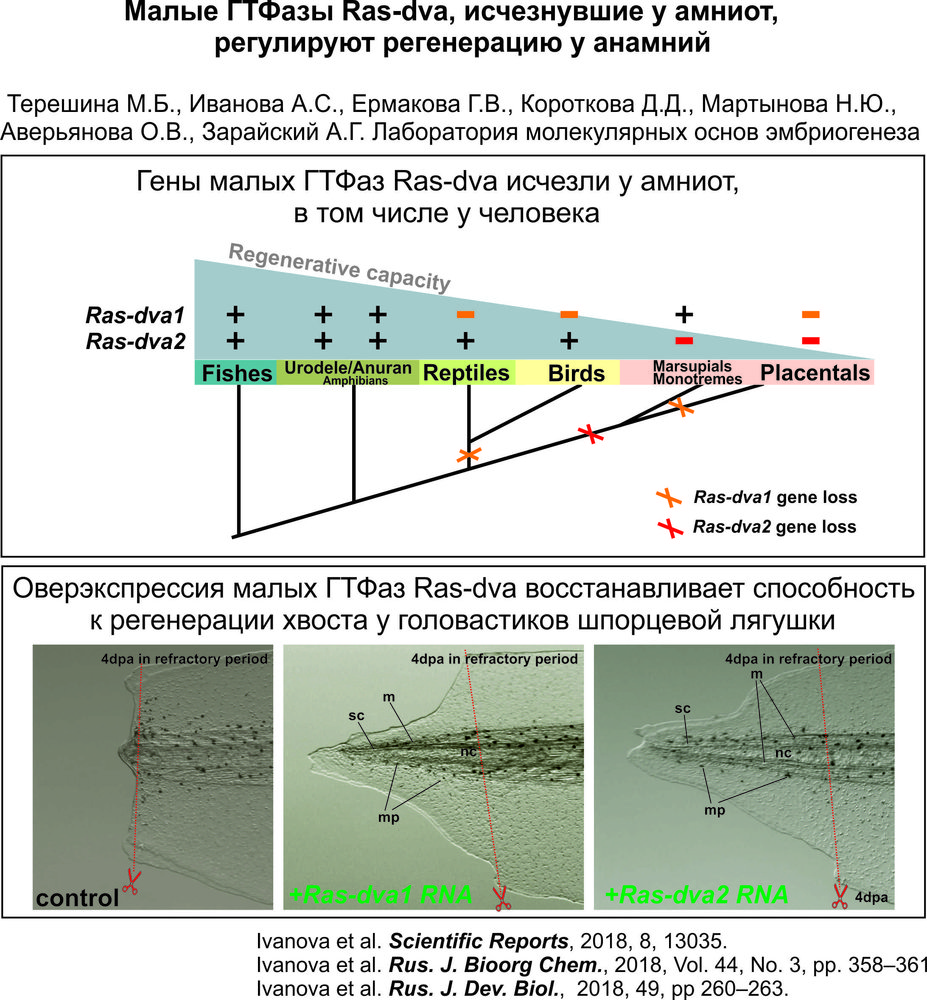
Анамнии - рыбы и амфибии - обладают потрясающей способностью регенерировать органы Например, конечности, хвост, сердце, глаза и мозг. К сожалению, в ходе эволюции амниоты - рептилии, птицы и млекопитающие - утратили способность к эффективной регенерации. Мы предположили, что потеря регенерационной способности связана с утратой некоторых генов, отвечающих за образование в ране бластемы — группы активно делящихся дедифференцированных клеток, гарантирующих регенерацию. В подтверждение этому мы показали, что у амниот отсутствуют гены малых ГТФаз Ras-dva, отвечающие у рыб и амфибий за формирование регенерационной бластемы, а, следовательно, и за один из механизмов регенерации.
- 2018 Ras-dva small GTPases lost during evolution of amniotes regulate regeneration in anamniotes. Sci Rep 8 (1) 13035
- 2018 Methods of In Vivo Gene-Specific Knockdown Using Morpholino and Vivo-Morpholino Oligonucleotides. Russ. J. Bioorganic Chem. 44 (3) 358–361
Отдел биоинженерии (ФИБХ)
Группа химии пептидов (Азев В.Н.)
,Лаборатория биологических испытаний (Мурашев А.Н.)
,Лаборатория химии белка (Липкин В.М.)
Разработка эффективных твердофазных методов получения пептидов обладающих иммуносупрессорной активностью

Проведено изучение эффективности различных методов получения пептидов, физиологичеки-активных в модели экспериментального автоимунного энцефаломиелита. Для поиска эффективных методов получения целевых пептидов опробованы различные варианты твердофазных методологий синтеза. С точки зрения химического выхода показана большая эффективность Fmoc/tBu методологии, не в последнюю очередь из-за возможности использования более широко круга активированных производных для преодоления медленной стадии реакций конденсации. Охорактеризованы некоторые побочные продукты, в частности, продукты удвоения аминоксилот, накопление которых в ходе химического синтеза осложняет очистку целевых продуктов методом ВЭЖХ. Разработанные методы позволили получить целевые продукты для проведения биологических испытаний.
- 2018 Immunosuppressant Peptide Abu-TGIRIS-Abu-NH2and its Application for Treatment of Multiple Sclerosis. Bionanoscience 8 (1) 484–489
- 2018 Efficacy of synthetic peptide corresponding to the ACTH-like sequence of human immunoglobulin G1 in experimental autoimmune encephalomyelitis. Front Pharmacol 9 113
Отдел биологических испытаний
Лаборатория пептидных биорегуляторов (Наволоцкая Е.В.)
,Лаборатория белков гормональной регуляции (Липкин В.М.)
Механизм неопиоидного действия β-эндорфина на активность оси гипоталамус гипофиз надпочечники
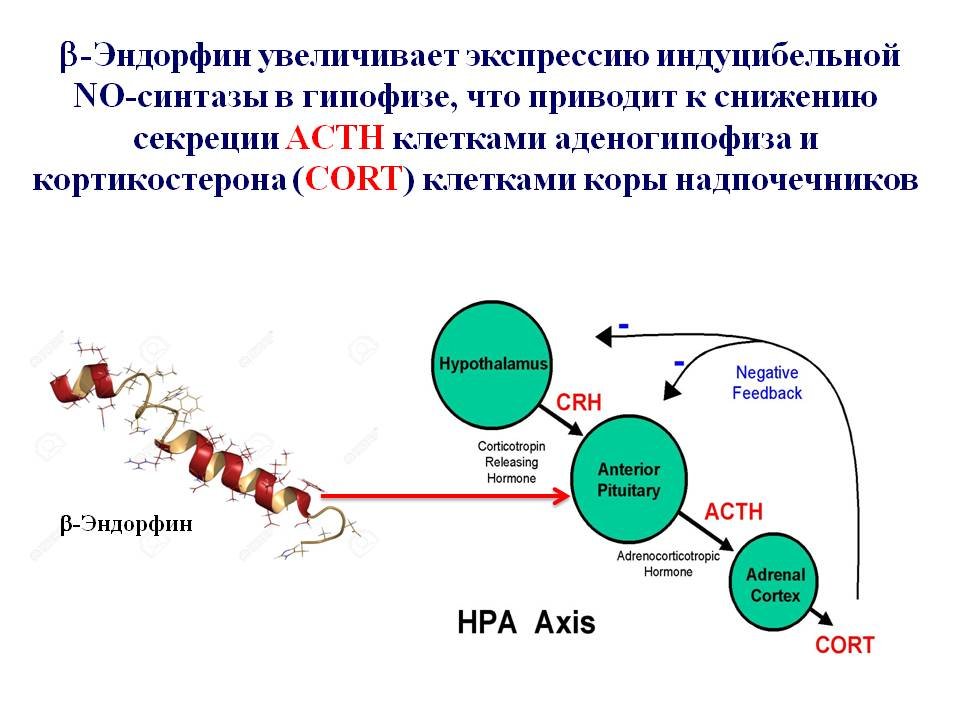
Установлено, что связывание β-эндорфина с неопиоидным рецептором на клетках аденогипофиза приводит к увеличению экспрессии индуцибельной NO-синтазы, результатом чего является снижение секреции ACTH и кортикостерона. Таким образом, показано, что неопиоидный рецептор бета эндорфина и его агонисты вовлечены в регуляцию оси гипоталамус гипофиз надпочечники на уровне гипофиза и надпочечников.
- 2017 Synthetic Peptide TPLVTLFK, a Selective Agonist of Nonopioid β-Endorphin Receptor, Reduces the Corticotropin and Corticosterone Response. Int J Pept Res Ther 23 (1) 111–118
- 2015 Octarphin, a nonopioid peptide of opioid origin. Russ. J. Bioorganic Chem. 41 (5) 467–473
- 2015 Octarphin--Nonopioid Peptide of the Opioid Origin. Bioorg Khim 41 (5) 524–530
- 2013 Synthetic peptide octarphin (TPLVTLFK) inhibits the activity of the hypothalamus-pituitary-adrenal axis through nonopioid β-endorphin receptor. Regul Pept 183 (1) 23–26
НПП «Питомник лабораторных животных» (Телегин Г.Б.)
Разработка новых подходов в создании и криосохранении геномодифицированных животных-биомоделей в соответствии с требованиями AAALACi и ISO
Расширена коллекция Криобанка ПЛЖ за счет сохранения уникальных для России геномодифицированных линий мышей. Разработан и формализован Стандарт Организации «Криосохранение генетических ресурсов». Разработана и внедрена в производство модель структурированной травмы спинного мозга у крыс SPF-категории. Система менеджмента производства мелких лабораторных грызунов SPF-категории ресертифицирована компанией SGS UK Ltd., как отвечающая требованиям стандарта ISO 9001:2015.
- 2018 Experimental Models of Spinal Cord Injury in Laboratory Rats. Acta Naturae 10 (3) 4–10
- 2018 Phosphorylation of the Amyloid-Beta Peptide Inhibits Zinc-Dependent Aggregation, Prevents Na,K-ATPase Inhibition, and Reduces Cerebral Plaque Deposition. Front Mol Neurosci 11 302
- 2018 Intravenously injected amyloid-β peptide with isomerized Asp7 and phosphorylated Ser8 residues inhibits cerebral β-amyloidosis in AβPP/PS1 transgenic mice model of Alzheimer's disease. Front Neurosci 12 518
14 января 2019 года

